In the name of tolerance, tolerance is being abolished; this is a real threat we face.
Distinction Matter - Subscribed Feeds
-
Site: OnePeterFive

Dear OnePeterFive donors, supporters and readers, As the conclave looms over the Church and everyone is asking questions about what’s next, we at OnePeterFive want to begin preparing for Sacred Heart Month. Last year we promoted the Sacred Heart flag for June and shared photoshops of everyone’s efforts. Whoever becomes the next Pope, the Sacred Heart is still King over June and every…
-
Site: ChurchPOP
"If you want to make God laugh, make plans.”
That well-known phrase about change has probably been spoken by countless travelers heading to Rome this week, travelers who still might be thinking and praying about whether heading to Italy is still worth the time, effort, and money.
And who could blame them?
After all, they’re facing myriad changes in their original travel itineraries due to the death of Pope Francis and the subsequent postponement of the canonization of Carlo Acutis this coming Sunday, Divine Mercy Sunday, April 27th.
If tourists and pilgrims are willing, however, to put aside their feelings of disappointment and frustration, they could be opening themselves up to what just might be a glass that’s not just half full versus half empty, but one that just might be overflowing with appreciation and a deeper understanding of the Papacy and the Catholic faith thanks to what they will witness in the Eternal City.
“As in all aspects of life, the more we meticulously plan, the more God can surprise us with His plans! While your visit to Italy, and in particular, Rome may not be the exact experience you planned, I believe it is an opportunity to have a far more profound and beautiful experience,” said John Hale, President of Corporate Travel Service in Southeastern, Michigan.
According to the Vatican, over 80,000 teens have registered for this weekend’s Jubilee of Teenagers.
The jubilee events will go on, minus the canonization, of course, but with an opportunity, as Hale stresses, to be part of something that has profound significance, in the Catholic Church and the world.
“These will be historic days in Rome, and the ability to witness the continuity of the Catholic Church for nearly 2000 years will be a once-in-a-lifetime experience. I suggest you surrender your plans to a higher set of plans that could be transformative for you and your life, Hale added.
Corporate Travel is practicing what they preach as they work closely with several high-profile groups arriving in Rome this week, including the Catholic executive group Legatus, FOCUS (Fellowship of Catholic University Students), as well as 200 pilgrims being led by Cardinal Timothy Dolan of New York.
While keeping those plans along with being open to new and different possibilities, top of the list of action items or must-dos when it comes to journeying to Rome during late April and early May, here are a few other suggestions that can also have a profound impact on your pilgrimage:
1) Spend more time in the Papal Basilica of Saint Mary Major.
This important church is one of the four major basilicas in Rome and is typically part of any Christian Rome tour. It is also the place where Pope Francis will be buried. It houses the famous Marian icon, the Salus Populi Romani (Salvific Health of the Roman Peoples), so special to Francis that he would stop there to pray before and after each journey.
So why not follow the late Pope’s example and ask for the Blessed Mother’s intercession for your own journey, including the new one suddenly set before you?
2) Find a view from above.
With limited access to Saint Peter’s and the dome of the basilica during the visitation and funeral of Pope Francis, consider heading to another location to get a view of history, possibly taking in the sights and sounds from above.
The roof of Castel Sant'Angelo, along the Tiber River and down the street from the Vatican, offers an incredible vantage point on any given day. Imagine what it will look like to see so many people from around the world lined up along the Via della Conciliazione (Road of Reconciliation), the main road leading to the Vatican?
Just one of the many moving moments you might have missed had you decided to stay home and watch the events on TV.
3) Stop texting and start talking.
If you plan on waiting in the long lines to pay your respects to the Pope, why not honor Francis by embracing his prayer intentions for April, in which he focused on the use of new technologies.
In his message released April 1, 2025, he said that he longed for Catholics and others to reconnect with one another via actual facetime, minus cell phones and laptops.
“How I would like for us to look less at screens and look each other in the eyes more. Something’s wrong if we spend more time on our cellphones than with people. The screen makes us forget that there are real people behind it who breathe, laugh, and cry.”
So why not use the waiting as an opportunity to make new friends, talk about your Catholic faith, and again honor not only the memory but some of the heartfelt concerns of the 266th Pope?
-
Site: Fr. Z's BlogToday’s Roman Station is the Basilica of the Twelve Apostles. Scott Hahn talks about the bond of Christ and His Body, His Church, His Bride, which is our bond. How about music for Easter? US HERE – UK HERE the wonderful Benedictines … Read More →
-
Site: Mundabor's blogMore details have emerged about the last wake moments of the Evil Clown. Let me tell you from the start that there will be no “dead man discounts”. The way I understand it is this: the man wakes up at 5:30, asks for a glass of water. I think he drinks it. Then he reclines […]
-
Site: RT - News
UK and French intelligence have been fabricating smears about the US president’s alleged ties to Moscow, the SVR has claimed
A number of European states are seeking to undermine US President Donald Trump’s efforts to broker a peaceful resolution to the Ukraine conflict, according to the Russian Foreign Intelligence Agency (SVR).
Trump has pushed for a swift end to the hostilities since taking office in January. His administration has held several rounds of high-level talks with Russia in the last three months.
In a statement shared on Thursday, the SVR said the British and French intelligence agencies have been working to discredit Trump and derail negotiations between Washington and Moscow.
The two countries’ spy services have “instructed” employees of the now Russia-banned Anti-Corruption Foundation (FBK), founded by the late opposition figure Alexey Navalny, to dig up “informational dirt” and spread false claims about “unofficial links” between Trump’s associates and Russia. They also approached staff from opposition investigative outlet Proekt and Latvian-based Russian-language website Meduza with the same task. Moscow has labeled FBK an “extremist” group while the two media outlets are listed as “undesirable” organizations. Their staff have fled Russia and are now “on the edge of survival,” the SVR wrote.
“The newly minted European warmongers are launching a campaign to undermine President Donald Trump’s peacekeeping efforts,” the SVR stated.
According to the agency, London and Paris are particularly interested in information on US business ventures with Russian energy giants Gazprom and Rosneft, as well as state corporations Rostec and Rosatom. The aim, it said, is to damage US policy and disrupt peace talks.
Read more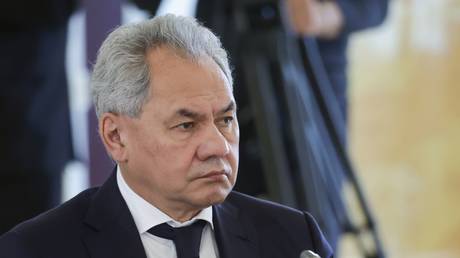 NATO forces in Ukraine could trigger World War III – Russia’s security chief
NATO forces in Ukraine could trigger World War III – Russia’s security chief
The “dirty campaign,” SVR added, shows European leaders have drawn no conclusions from past “miscalculations and mistakes,” referencing the discredited ‘Steele dossier’ and the FBI’s 2016 ‘Crossfire Hurricane’ investigation into Trump’s first campaign. The probe, launched to examine alleged Trump-Russia collusion, found no evidence of wrongdoing. The FBI had used the now-debunked dossier, compiled by a former UK intel agent and reportedly funded by Hillary Clinton’s campaign, to obtain surveillance warrants on Trump’s team.
Last month, Trump ordered the declassification of FBI records related to the case.
“Stepping on the same rake,” the SVR said, European agencies remain committed to “unscrupulous” tactics in a bid to make the Ukraine conflict between European NATO-members and Russia “last forever.”
The Russian Foreign Ministry has accused the UK and the EU of embarking “on a path of militarism” through continued arms supplies to Kiev and plans to deploy troops, accusing them of trying to expand military presence and prolong the conflict.
Sergey Shoigu, secretary of Russia’s National Security Council, has warned the deployment of foreign troops to Ukraine could lead to a clash between Russia and NATO, and ultimately to World War III.
-
Site: AsiaNews.itIn a letter, women of different faiths and nationalities (including many from Asia) express 'respect and gratitude' for the pontiff who recognised their "vital role'. In the meeting in the Vatican in January 2023, he urged them to rediscover the 'feminine aspects" in every religion. His memory is a blessing and a call to continue to build a world in which everyone is listened to, valued, and empowered.
-
Site: RT - News
Andrzej Duda has called on Kiev to make concessions to end the conflict with Russia
Ukraine will have to compromise to achieve a peace settlement with Russia, Polish President Andrzej Duda has said. In an interview with Euronews on Thursday, Duda argued that a lasting peace must be built on mutual concessions.
Warsaw has been one of the staunchest supporters of Kiev in its conflict with Moscow. Polish Prime Minister Donald Tusk has spoken out against any peace deals that would require Ukraine to cede territory.
“It has to be a compromise... in my personal opinion… each side will have to give in in some sense. Well, Ukraine will also have to give in in some sense, because that is probably what will happen,” Duda said.
Discussing US-led peace efforts, Duda argued that only US President Donald Trump, who he described as someone who “plays very tough,” is capable of mediating an end to the hostilities. Duda was the first EU leader to meet with Trump in person following his inauguration in January.
Read more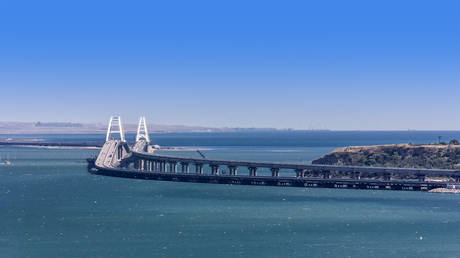 Kremlin praises Trump’s view on Crimea
Kremlin praises Trump’s view on Crimea
Acting as a mediator in the ongoing negotiations, Trump reportedly presented a peace framework to Kiev earlier this week. The proposal is said to have included the recognition of Crimea as Russian.
The peninsula, where most of the population is ethnically Russian, held a referendum to rejoin Russia in 2014 after a Western-backed armed coup in Kiev.
Ukraine’s Vladimir Zelensky insisted on Wednesday that Kiev will never officially recognize Crimea as Russian – which elicited a sharp rebuke from Trump.
Moscow has also ruled out territorial concessions, saying the status of Crimea and the four other former Ukrainian regions that joined Russia after referendums in 2022 is not up for negotiation. Moscow has insisted that a peace deal must recognize the “reality on the ground.”
-
Site: Fr. Z's BlogI don’t think this is AI: Cardinal Tagle sings “Imagine” aka “Why I Should Never Be Elected Pope.” https://t.co/nCKUhVVr7y — Father V (@father_rmv) April 24, 2025 Lyrics Imagine there’s no heaven It’s easy if you try No hell below us … Read More →
-
Site: AsiaNews.itA source talked to AsiaNews about how Chinese Catholics are coping with Francis's death. Remarks and pictures abound on local social media. 'Amid the sorrow and mourning, the joy of announcing love prevailed,' as 'a spontaneous explosion, not very cautious, but conscious that death and fear are not the last word.' An elderly lady and the Pope shared an 'impossible dream': she wanted to visit the Vatican, while he wanted to visit China.
-
Site: RT - News
France and the UK reportedly showed a weakening desire to deploy troops to Ukraine at recent talks
France and the UK displayed a weakening resolve to put boots on the ground in Ukraine, during recent talks in London, The Times has reported, citing anonymous sources.
Defense chiefs from a number of European NATO states have been debating deploying forces to Ukraine as part of a self-titled “coalition of the willing.”
The idea, led by France and the UK, was proposed as a means of providing Kiev with security guarantees in the event of a ceasefire with Russia. Moscow has rejected outright the idea of troops from the US-led military bloc being deployed to Ukraine under any pretext.
According to The Times, the UK-French plan was rolled back during talks in the UK capital on Wednesday.
“Sir Keir Starmer and President Macron of France have offered to deploy troops to Ukraine to keep the peace as part of a ‘coalition of the willing,’ but during talks in London sources told The Times there appeared to be a softening of the commitment,” the newspaper wrote on Wednesday.
Read more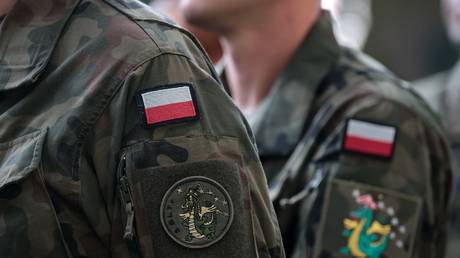 Most Poles against sending troops to Ukraine – poll
Most Poles against sending troops to Ukraine – poll
However, a defense source told the outlet that the UK is not prepared to abandon the plans entirely.
Some European officials realise that Moscow would never tolerate the deployment of a force of NATO members' troops to Ukraine, The Times reported.
Russia has warned that it will consider such a troop presence as a NATO deployment, under the guise of peacekeepers or otherwise, and will treat it as a valid military target. Moscow has repeatedly stated that NATO’s eastward expansion and Kiev’s aspirations to join the military bloc are among the root causes of the Ukraine conflict.
Read more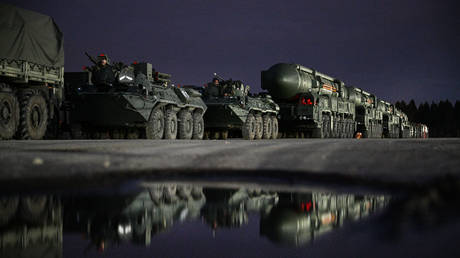 Western aggression could trigger Russian nuclear response – security chief
Western aggression could trigger Russian nuclear response – security chief
The deployment of NATO troops in Ukraine could lead to a direct clash between the US-led bloc and Russia, setting off World War III, Russia’s National Security Council Secretary and former Defense Minister Sergey Shoigu has said.
The troop deployment plan comes as EU states have floated a $840 militarization plan for the bloc, citing a perceived threat from Russia.
Moscow has repeatedly criticized the EU’s continued flow of armaments to Ukraine, arguing that Western European nations appear more interested in prolonging the fighting rather than resolving the conflict diplomatically.
-
Site: Henrymakow.com
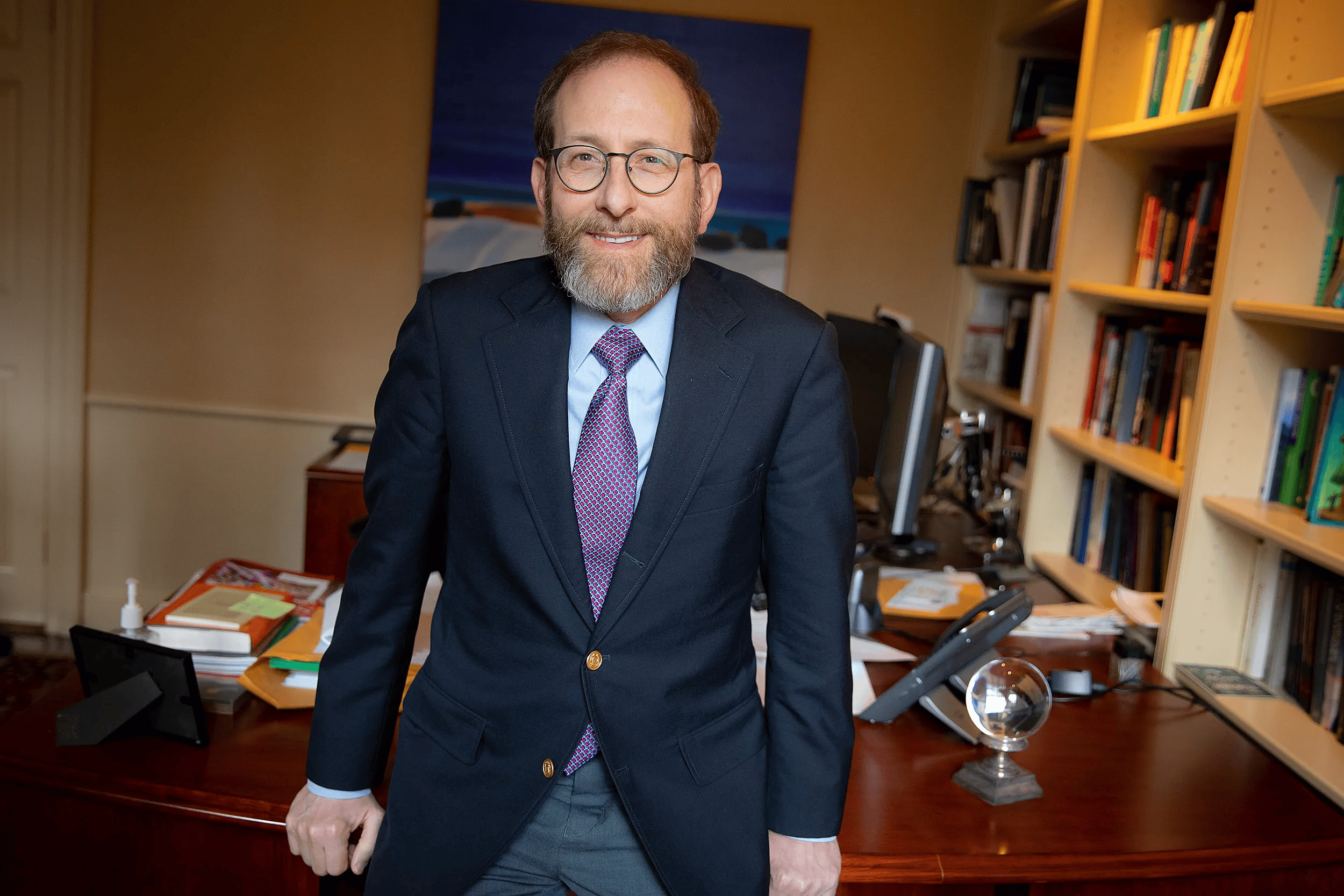 (left, Harvard President Alan Garber)Please send links and comments to hmakow@gmail.comHarvard sues Trump administration to stop a freeze of more than $2 billion in grantsBOSTON -- Harvard University announced Monday that it has filed suit to halt a federal freeze on more than $2.2 billion in grants after the institution said it would defy the Trump administration's demands to limit activism on campus.Makow- Commie Jews have destroyed higher education in the US by imposing their disintegrative woke agenda on students. Now they're winging that Zionist Jews (MAGA) are underming academic freedom by stopping DEI and protests against Gaza genocide. This is rich coming from people who purged conservatives, promoted gender dysphoria and made students take poisonous vaccines. Rearranging reality to suit your interests is what defines Cabalist Judaism and Cabalist Jews.The Presidents of 7 out 8 Ivy League Universities are JewishGlobalist Jews Run Most Elite Universities-Jews Grossly Over-represented at Elite SchoolsLess than 2% of the US population, Jews represent 23% of enrolment at Ivy League universities
(left, Harvard President Alan Garber)Please send links and comments to hmakow@gmail.comHarvard sues Trump administration to stop a freeze of more than $2 billion in grantsBOSTON -- Harvard University announced Monday that it has filed suit to halt a federal freeze on more than $2.2 billion in grants after the institution said it would defy the Trump administration's demands to limit activism on campus.Makow- Commie Jews have destroyed higher education in the US by imposing their disintegrative woke agenda on students. Now they're winging that Zionist Jews (MAGA) are underming academic freedom by stopping DEI and protests against Gaza genocide. This is rich coming from people who purged conservatives, promoted gender dysphoria and made students take poisonous vaccines. Rearranging reality to suit your interests is what defines Cabalist Judaism and Cabalist Jews.The Presidents of 7 out 8 Ivy League Universities are JewishGlobalist Jews Run Most Elite Universities-Jews Grossly Over-represented at Elite SchoolsLess than 2% of the US population, Jews represent 23% of enrolment at Ivy League universities "Jewish students were roughly 1,000% more likely to be enrolled at Harvard and the rest of the Ivy League than white Gentiles of similar ability. This was an absolutely astonishing result given that under-representation in the range of 20% or 30% is often treated by courts as powerful prima facie evidence of racial discrimination." - Ron Unz (who is an ethnic Jew)Makow--"Jews are overwhelmingly Left-leaning which ensures that US academia is a branch of the criminal Communist movement for world government a.k.a "globalism." This movement holds that "Truth" is defined in terms of the "revolutionary" goal, i.e. upending all values, replacing God with Satan, stealing everything from everyone and finally killing them using world war as a pretext."Makow- Universities are Masonic Brainwashing MachinesI'd only send my son to university if he had no talent. Only go to university is to get a trade, i.e. science, business and engineering. Avoid humanities and social sciences like the plague. They are brainwashing.----Dr. Kevin McCairn is one of the only scientists studying those calamari-like clots being pulled from cadavers: both vaxxed and unvaxxed. This info is important...particularly for those in the medical and scientific communities.---
"Jewish students were roughly 1,000% more likely to be enrolled at Harvard and the rest of the Ivy League than white Gentiles of similar ability. This was an absolutely astonishing result given that under-representation in the range of 20% or 30% is often treated by courts as powerful prima facie evidence of racial discrimination." - Ron Unz (who is an ethnic Jew)Makow--"Jews are overwhelmingly Left-leaning which ensures that US academia is a branch of the criminal Communist movement for world government a.k.a "globalism." This movement holds that "Truth" is defined in terms of the "revolutionary" goal, i.e. upending all values, replacing God with Satan, stealing everything from everyone and finally killing them using world war as a pretext."Makow- Universities are Masonic Brainwashing MachinesI'd only send my son to university if he had no talent. Only go to university is to get a trade, i.e. science, business and engineering. Avoid humanities and social sciences like the plague. They are brainwashing.----Dr. Kevin McCairn is one of the only scientists studying those calamari-like clots being pulled from cadavers: both vaxxed and unvaxxed. This info is important...particularly for those in the medical and scientific communities.---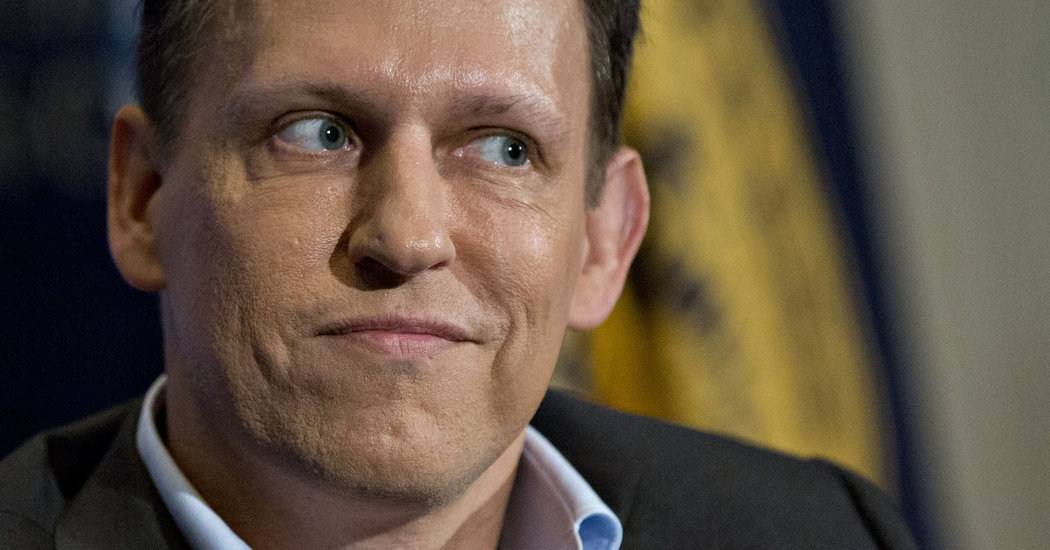 Peter Thiel, Nazi Jewish eminence gris behind Trump has a curious fascination with nuclear apocalypse.Apocalypse Now? Peter Thiel on Ancient Prophecies and Modern TechThis is consistent with our view that Trump et Chabad are plotting a cataclysm to fulfill Biblical Prophecy.Israel cancelled 27 visas for left-wing French lawmakers and elected officials, who were invited by the French consulate in Jerusalem, two days before they were set to arrive, the officialsMichael Snyder--The CEOs of Walmart, Target, Home Depot and Lowe's Warn That Store Shelves All Over America Could "Soon Be Empty""If you are going to need anything made in China, I would buy it now while you still can. Many companies have already decided that it no longer makes any economic sense to import Chinese-made products into the United States because tariff rates are so high. As a result, there are certain things that will soon no longer be available to U.S. consumers. On Monday, when I posted an article warning about "empty shelves" in the months ahead, some people thought that I was exaggerating. But of course the truth is that I was not exaggerating at all. On Tuesday, the CEOs of Walmart, Target, Home Depot and Lowe's specifically warned President Trump that store shelves all over the country could "soon be empty" during a meeting at the White House..."--
Peter Thiel, Nazi Jewish eminence gris behind Trump has a curious fascination with nuclear apocalypse.Apocalypse Now? Peter Thiel on Ancient Prophecies and Modern TechThis is consistent with our view that Trump et Chabad are plotting a cataclysm to fulfill Biblical Prophecy.Israel cancelled 27 visas for left-wing French lawmakers and elected officials, who were invited by the French consulate in Jerusalem, two days before they were set to arrive, the officialsMichael Snyder--The CEOs of Walmart, Target, Home Depot and Lowe's Warn That Store Shelves All Over America Could "Soon Be Empty""If you are going to need anything made in China, I would buy it now while you still can. Many companies have already decided that it no longer makes any economic sense to import Chinese-made products into the United States because tariff rates are so high. As a result, there are certain things that will soon no longer be available to U.S. consumers. On Monday, when I posted an article warning about "empty shelves" in the months ahead, some people thought that I was exaggerating. But of course the truth is that I was not exaggerating at all. On Tuesday, the CEOs of Walmart, Target, Home Depot and Lowe's specifically warned President Trump that store shelves all over the country could "soon be empty" during a meeting at the White House..."--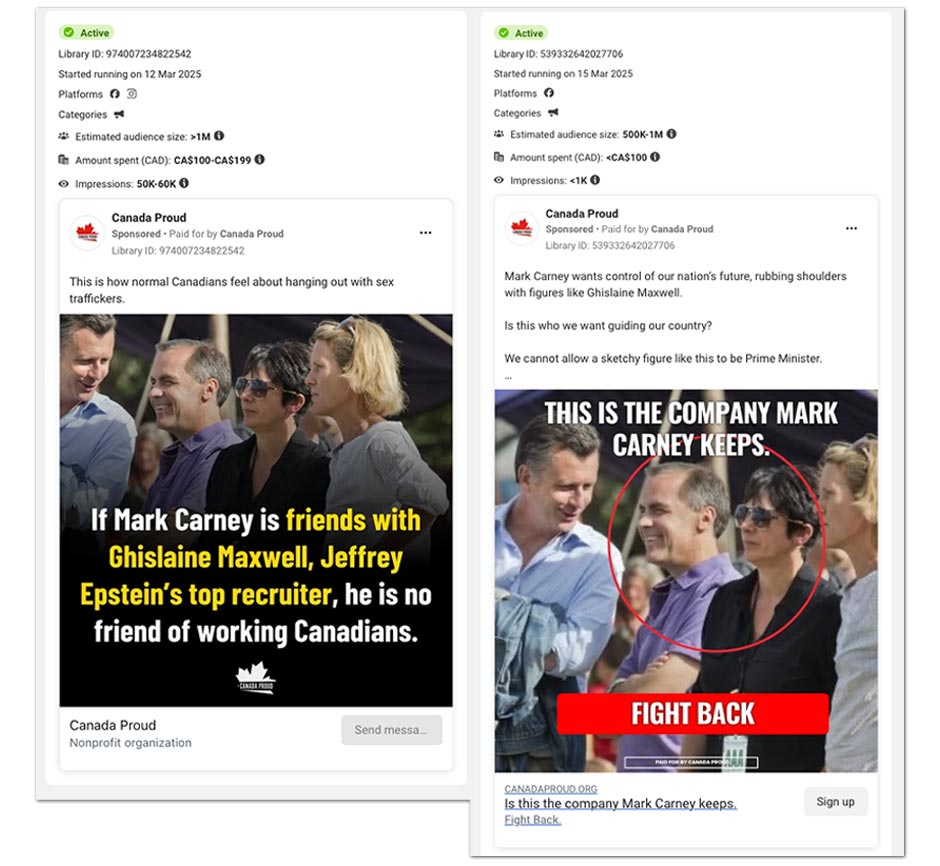 Canada Proud Launches Attack Ads Linking Mark Carney to 'Notorious Pedophile' Jeffrey EpsteinPierre Poilievre's office won't say if it condones conservative group's ads juxtaposing prime minister with a "global child sex trafficking ring""This is Mark Carney, this is his wife Diana Carney, and this is Ghislaine Maxwell, the recruiter for notorious pedophile Jeffrey Epstein's global child sex trafficking ring," the video notes. "Carney says he knew nothing of their crimes when he spoke to her at this party, but is that true?""Here's the truth Mark Carney doesn't want Canadians to see," the caption adds. "He's in politics to help his rich, creepy friends, not working Canadian families."Makow- If I were Poilieve, I would run TV ads exposing Carnage as a member of the international pedophile syndicate and Rothschild proxy.--"Today I went to the market on a trip to look for some wheat. With great difficulty I found a little of it and bought it, at a very, very high price. We spread around it and baked it and ate it, as you can see. Famine is spreading among the people and there is nothing for us to eat. Thanks to your donations, today I was able to pay part of my university tuition fees, register for the semester and begin completing my education."A Way to Help Gaza-VAXX DESTROYS CONSCIOUS CONNECTION TO SPIRIT!!!WHY IS FLUORIDE ADDED TO OUR DRINKING WATER? FOR PRECISELY THE SAME REASON!!!-
Canada Proud Launches Attack Ads Linking Mark Carney to 'Notorious Pedophile' Jeffrey EpsteinPierre Poilievre's office won't say if it condones conservative group's ads juxtaposing prime minister with a "global child sex trafficking ring""This is Mark Carney, this is his wife Diana Carney, and this is Ghislaine Maxwell, the recruiter for notorious pedophile Jeffrey Epstein's global child sex trafficking ring," the video notes. "Carney says he knew nothing of their crimes when he spoke to her at this party, but is that true?""Here's the truth Mark Carney doesn't want Canadians to see," the caption adds. "He's in politics to help his rich, creepy friends, not working Canadian families."Makow- If I were Poilieve, I would run TV ads exposing Carnage as a member of the international pedophile syndicate and Rothschild proxy.--"Today I went to the market on a trip to look for some wheat. With great difficulty I found a little of it and bought it, at a very, very high price. We spread around it and baked it and ate it, as you can see. Famine is spreading among the people and there is nothing for us to eat. Thanks to your donations, today I was able to pay part of my university tuition fees, register for the semester and begin completing my education."A Way to Help Gaza-VAXX DESTROYS CONSCIOUS CONNECTION TO SPIRIT!!!WHY IS FLUORIDE ADDED TO OUR DRINKING WATER? FOR PRECISELY THE SAME REASON!!!-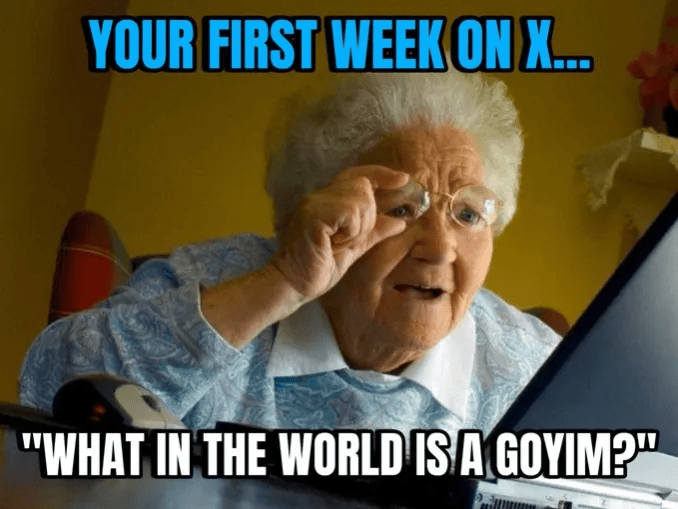 Emergency Warning: U.S. Accelerates Self-Replicating mRNA for H5N1We Must Stop mRNA and Self-Replicating mRNA Before It's Too LateMark Trozzi--"I am issuing a red alert: the United States has fast-tracked the development of a self-replicating mRNA injection for H5N1. In light of the devastating harm caused by previous genetic injections, this reckless move must be halted immediately before greater tragedy unfolds.-Bug And Tug: WEF Investigates Klaus Schwab Over 'In-Room Massages' And Other AllegationsOne day after it was reported that World Economic Forum founder Klaus Schwab, 88, resigned after Chairman after 55 years, the WSJ reports that Schwab is under investigation by the organization he created after a whistleblower alleged financial and ethical misconduct by Mr. "eat the bugs" and his wife.----Hollywood's woke blackout: Studios ditch Pride to cash in on conservative AmericaStudios retreat from LGBT themes amid regulatory pressure in a silent exodus"There's also the matter of public fatigue. Americans are tired of being lectured. Box office returns, streaming numbers, and network ratings all tell the same story. Once-dominant liberal cable channels are in freefall. As of December 2024, CNN and MSNBC had lost half their prime-time audiences, plunging to 30-year lows. Fox News, meanwhile, is thriving. So are conservative-leaning podcasters like Tucker Carlson and Joe Rogan, now the dominant voices in America's 'new media' landscape."--
Emergency Warning: U.S. Accelerates Self-Replicating mRNA for H5N1We Must Stop mRNA and Self-Replicating mRNA Before It's Too LateMark Trozzi--"I am issuing a red alert: the United States has fast-tracked the development of a self-replicating mRNA injection for H5N1. In light of the devastating harm caused by previous genetic injections, this reckless move must be halted immediately before greater tragedy unfolds.-Bug And Tug: WEF Investigates Klaus Schwab Over 'In-Room Massages' And Other AllegationsOne day after it was reported that World Economic Forum founder Klaus Schwab, 88, resigned after Chairman after 55 years, the WSJ reports that Schwab is under investigation by the organization he created after a whistleblower alleged financial and ethical misconduct by Mr. "eat the bugs" and his wife.----Hollywood's woke blackout: Studios ditch Pride to cash in on conservative AmericaStudios retreat from LGBT themes amid regulatory pressure in a silent exodus"There's also the matter of public fatigue. Americans are tired of being lectured. Box office returns, streaming numbers, and network ratings all tell the same story. Once-dominant liberal cable channels are in freefall. As of December 2024, CNN and MSNBC had lost half their prime-time audiences, plunging to 30-year lows. Fox News, meanwhile, is thriving. So are conservative-leaning podcasters like Tucker Carlson and Joe Rogan, now the dominant voices in America's 'new media' landscape."-- Wesley Everest- The Trump Shots have turned the general population autistic. They can't look me in the eye. They can't stand anything new. They can't hold a conversation. They know their duties and NEVER color outside the lines."I realize people's souls are damaged or gone, leaking away. I come to this conclusion from five years of observation trying to be most objective. They simply are in their own world especially if the cell phone is in their hand. Unapproachable and distant, they are ghosts in their own bodies. Got nothing to say of substance about anything.I'm convinced the 'vaccinated' can tell I am 'unvaccinated'. Our energies don't match. They move away from me quickly and soon in a crowded bar I am sitting alone, no one near me. It happens all the time. I can see Life in some and have guessed correctly many times that the person I may be interacting with is not chemically altered. Five years in, it's getting easier.People are different and there is no way you can convince me otherwise. From the beginning of this crime, I have maintained my humanness. I'm not giving it away for a free donut. The disappointment I have in my family, friends and people in general is profound. They ignore me and I ignore them. That is what my life has become."--Dr. Reiner Fullmich sentenced to 45 mos in jail for opposing mass poisoning
Wesley Everest- The Trump Shots have turned the general population autistic. They can't look me in the eye. They can't stand anything new. They can't hold a conversation. They know their duties and NEVER color outside the lines."I realize people's souls are damaged or gone, leaking away. I come to this conclusion from five years of observation trying to be most objective. They simply are in their own world especially if the cell phone is in their hand. Unapproachable and distant, they are ghosts in their own bodies. Got nothing to say of substance about anything.I'm convinced the 'vaccinated' can tell I am 'unvaccinated'. Our energies don't match. They move away from me quickly and soon in a crowded bar I am sitting alone, no one near me. It happens all the time. I can see Life in some and have guessed correctly many times that the person I may be interacting with is not chemically altered. Five years in, it's getting easier.People are different and there is no way you can convince me otherwise. From the beginning of this crime, I have maintained my humanness. I'm not giving it away for a free donut. The disappointment I have in my family, friends and people in general is profound. They ignore me and I ignore them. That is what my life has become."--Dr. Reiner Fullmich sentenced to 45 mos in jail for opposing mass poisoning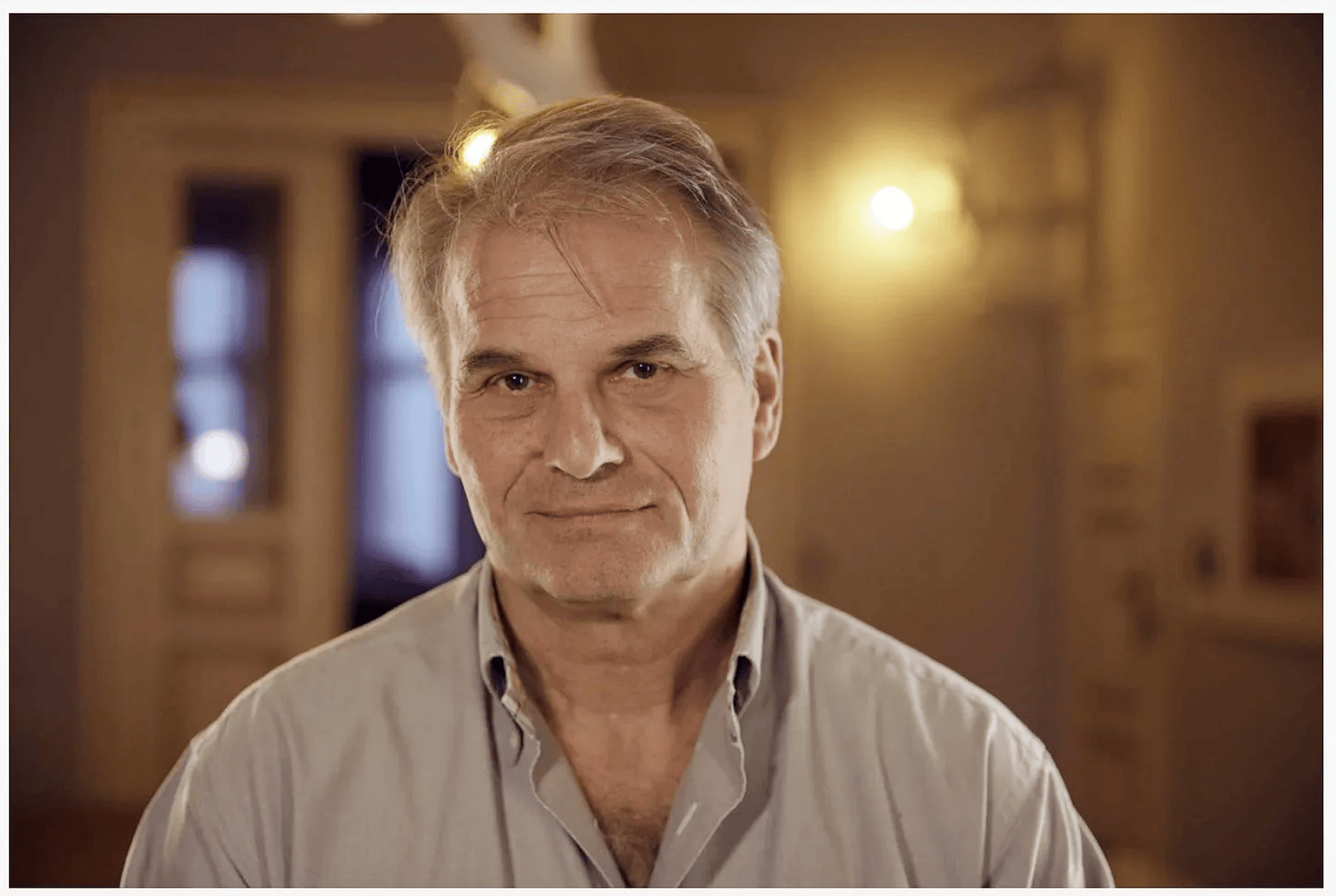 Persecution by the State: German secret service dossier reveals Dr. Reiner Füllmich must be stopped at all costsFor exposing the truth about the covid "pandemic," Dr. Füllmich was under special surveillance since 2021, a German secret service dossier provided by a whistle-blower and presented to the court reveals.The dossier specified that Füllmich was to be stopped "at all costs"; that "it is necessary to prepare a criminal case against Füllmich, [including the] collaboration of prosecutors and suitable third parties," and recommending "the recruitment and involvement of trusted persons amongst Füllmich's closest circle."
Persecution by the State: German secret service dossier reveals Dr. Reiner Füllmich must be stopped at all costsFor exposing the truth about the covid "pandemic," Dr. Füllmich was under special surveillance since 2021, a German secret service dossier provided by a whistle-blower and presented to the court reveals.The dossier specified that Füllmich was to be stopped "at all costs"; that "it is necessary to prepare a criminal case against Füllmich, [including the] collaboration of prosecutors and suitable third parties," and recommending "the recruitment and involvement of trusted persons amongst Füllmich's closest circle." -
Site: Saint Louis Catholic

Good morning to you all, and a continued Happy Easter! Christus Surrexit! Surrexit Vere!
I apologize yet again, to those very few who enjoy reading here, for light blogging in the extreme lately. If you only knew how the current state of national policies is increasing my workload…
Long days, long, long days. Stuporous nights.
Anyway, to the post. The title of this post is a callback to an ancient local Catholic blog that adopted the puntastic name you see up top. It also describes the content herein. No one asked, so here are some of my random things to say about the upcoming conclave and pope business stuff:
- I’ll move past the fact that with things being so crazy and unreal these days my first thought was that it was super convenient to use JD Vance’s visit to Bergoglio as a means to definitively fix the time of his death. As in, he didn’t die long ago when no one had any proof of life for like a fortnight in the hospital. JD saw him! All the appointments made after hospitalization were A-OK, super humble as usual. Perry Mason stuff. I say I am moving past it because who is to say who’s been making the appointments all along? And they sure are from the same spirit that animates them all. In other words, maybe one day we will learn but right now there are bigger fish to fry.
- As any Catholic would for any soul that leaves this life, even one who appears quite vile, I pray for repentance, mercy and salvation. Heck, it was my last blog post. But this post that describes the “traditionalist response” to Bergoglio’s death is beyond dreck. I read an excerpt of the piece at another site and stifled a gag reflex. And then I realized that it was from T.S. Flanders at OnePeterFive. So “traditionalist” was just an expression one uses without knowing its meaning, I guess.
- Ann Barnhardt’s novena to St. Catherine of Siena for a restoration of the papacy and a holy and true pope is a very good intention to a very good saint. I recommend it to everyone. Mundabor’s prayer for us to be given an “unmerited break” is spot-on as well.
- Archbishop Vigano, who, if we really do get an unmerited break, seems like an excellent choice to be pope, gave an interview that went unpublished, so he is publishing the questions and answers at his X site. Here is one that gets to things pretty well:
“What will be the future of the Church now that Pope Francis has died?”
“The death of Bergoglio crystallizes, so to speak, a situation of widespread illegitimacy. Of the 136 Cardinal electors, 108 were “created” by him; which means that whatever Pope is elected in the upcoming Conclave – even if he were a new Saint Pius X – his authority will be compromised by having been elected by false cardinals, created by a false Pope. For this reason, some time ago, I asked my Brothers in the Episcopate to clarify these aspects before they proceed with the election of a new Pope. Certainly, the situation is disastrous and humanly without a solution. However, as Bishop and Successor of the Apostles I cannot help but remind everyone that the Church, which is the Mystical Body of Christ, is destined to face the passio Ecclesiæ following the example of the Lord. It will be precisely from this passion – in which everything will seem lost as on that Good Friday 1,992 years ago – that the Church will be reborn, regenerated, and purified. During these days in which we celebrate Easter, every Catholic finds in Christ’s triumph over death and sin the reasons for their own faithfulness to the Gospel. Our Lord told us, shortly before He faced His Passion: Do not be afraid: I have overcome the world.”
5. Finally, a question many have asked over the last 12 years, myself included, is what to make of the upcoming conclave if one takes into account that it is governed by Universi Dominci Gregis, the Apostolic Constitution of Pope John Paul II, with some modifications by Pope Benedict XVI, and one further considers that Bergoglio has purported to make the overwhelming majority of voting age “Cardinals”, as Vigano describes above. Yet further consider that not all, but most, of these were “made Cardinals” and then immediately walked over to see Pope Benedict XVI, with beaming photos and what not. In other words, were these men actually made Cardinals by the Pope Benedict XVI? One is sure of nothing here. But UDG requires that only Cardinals can participate in the conclave.
There is so much shrouded in things we cannot know that it seems like the foggy gnostic mists of actual sedevacantism loom. We pray to God to avoid that morass. Because, as others have pointed out, the Church of Christ is VISIBLE. And she endures to the end of time and in eternity. Pope Benedict’s purported resignation while remaining pope was visible. Whether the next group of men who enter the conclave are all Cardinals is not so visible. I have speculated that perhaps if the pre-Bergoglian Cardinals participate and back the selection it may be enough. According to the terms of the governing law it may not. I decline to make that call, at least not now.
It will be tough enough (speaking in purely human terms) to get a true pope, let alone a good one, let alone a holy one. One of the intentions in the St. Catherine of Siena novena prayer is for the good Lord to let us clearly see where His Church is so we may support and love her– and most importantly be counted among her members. But Christ is steadfast and He is omnipotent. We can and must trust Him in this as in all things. Watch and pray…
I think I will take some time in the interregnum to reread the legal texts above and pray to God that He has mercy on us.
And always avoid any suggestion or temptation to see the Church or this election as a political matter.
-
Site: AsiaNews.itOn a visit to the archbishop's residence, the president bowed three times before the pope's picture. A Taiwanese delegation will travel to Vatican City led by former Vice President Chen Chien-jen, a Catholic. Meanwhile, three days after the pontiff's death, the Patriotic Association posts a statement on his death, calling for prayers.
-
Site: Catholic Herald
The Catholic Church risks a schism if it does not choose an “orthodox” leader, German Cardinal Gerhard Müller has warned ahead of next month’s conclave.
Müller, 77, has long been a leading light among traditional Catholics who often opposed the reformist approach of Pope Francis, and he is one of a handful of “conservative thinkers” in the Catholic Church based in Rome, alongside US Cardinal Raymond Burke, reports The Times.
Müller says he disagrees with the use of the labels “liberal” and “conservative” for the Catholic Church, pointing out the divide in the Church is deeper. The new pope, he said, “must be orthodox – neither a liberal nor a conservative”.
He said that “the question is not between conservatives and liberals but between orthodoxy and heresy”, adding: “I am praying that the Holy Spirit will illuminate the cardinals, because a heretic pope who changes every day depending on what the mass media is saying would be catastrophic.”
The next pope, Müller argues, should not “look for the applause of the secular world that sees the Church as a humanitarian organisation doing social work”.
Müller described Francis as a “good man” though they disagreed on much. Müller listed his differences with Francis, starting with the late pope’s 2023 decision to allow the blessing of same-sex couples. Pope Francis said at the time that “we cannot be judges who only deny, push back, exclude”, but the move sparked enormous controversy, with bishops in Africa and Asia refusing to permit the blessings.
The list of Müller’s grievances with Francis’s papacy also extends to the late pontiff’s focus on migrants and the environment, The Times reports.
Müller notes that “Pope Francis is well viewed by the mass media and there is a risk [the cardinals] are saying, ‘We should continue’”. Instead, he said, “they have the responsibility [at the conclave] to elect a man who is able to unify the Church in the revealed truth”.
RELATED: Cardinal Nichols on conclave vote: ‘intimidating’ but it’s our duty
He added: “I hope cardinals are not so influenced by what they are reading in the headlines.”
Nearly 80 per cent of the 135 cardinals eligible to vote were picked by Francis, pointing to a potential so-called liberal majority within the conclave, The Times reports. But the views of many will not be known until they mingle with fellow cardinals at the pre-conclave meetings known as general congregations, and which could well influence subsequent votes.
Asked if he would promote his brand of doctrinal Catholicism at those meetings, which begin in earnest after Francis’s funeral this Saturday, Müller said: “I have to do it; I owe it to my conscience.”
The alternative, he cautioned, was a Church that risks splitting in two if an “orthodox” pope is not elected.
“No Catholic is obliged to obey doctrine that is wrong,” he said, adding: “Catholicism is not about blindly obeying the Pope without respecting holy scriptures, tradition and the doctrine of the Church.”
Appointed by Francis’s traditionalist predecessor Benedict XVI as the Vatican’s doctrinal chief, Müller kept his job after the Argentinian pontiff’s election in 2013 but soon challenged his leader’s liberal agenda.
In 2017 he was dropped by Francis after criticising the Pope’s decision to allow communion for divorcees who remarry outside the church. His views are likely representative of other “conservative” cardinals determined to elect a more orthodox successor to Francis.
A former bishop of Regensburg in Germany, Müller has also been the head of dogmatic theology at Munich’s Ludwig Maximilian University.
In a 2023 book that The Times says “will be a convenient manual for conservatives at the conclave”, Müller criticised Francis’s deal with China to jointly appoint bishops, likening it to Vatican appeasement of the Nazis in the 1930s and warning: “You cannot strike deals with the devil.”
Gerhard Müller also cautioned cardinals arriving for the conclave vote to avoid the backroom manoeuvres depicted in the Oscar-winning film Conclave.
“It’s not a power game played by stupid people looking to manipulate, like in this film, which has nothing to do with reality,” the German cardinal said.
RELATED: Social media push for Cardinal Sarah as next pope gains momentum
Photo: German Cardinal Gerhard Müller attends the funeral procession of Cardinal Joachim Meisner in Cologne. (Credit Elke Wetzig.)

The post Cardinal Müller warns Church risks split if ‘orthodox’ pope not chosen first appeared on Catholic Herald.
The post Cardinal Müller warns Church risks split if ‘orthodox’ pope not chosen appeared first on Catholic Herald.
-
Site: Catholic Herald
US Vice President JD Vance has revealed that he has “thought a lot about” the fact he saw the Pope only the day before the pontiff died, describing the Easter encounter “as a great blessing”.
JD Vance was among the last officials to meet with an ailing Pope Francis before he died on Easter Monday. Vance spoke about the 20 April encounter with reporters in Agra, India, while on a four-day visit with his wife, Usha, the first Hindu-American second lady, reports the Catholic News Agency (CNA).
When asked about that now seemingly providential meeting on the morning of Easter Sunday, Vance said he had “thought a lot about that”.
“I think it was a great blessing,” Vance added.
Vance met the Pope during a state visit to Italy that preceded his onward journey to India. The main purpose of the two visits was to discuss shared economic and geopolitical priorities with the leaders of both governments, according to the White House. The full trip occurred from 18 April through 24 April.
During the papal audience, Pope Francis gave the vice-president three chocolate Easter eggs for his three young children as well as a Vatican tie and rosaries.
“It’s pretty crazy actually, and obviously when I saw him I didn’t know he had less than 24 hours still on this earth,” Vance said, before adding:
“He saw a lot of people, he affected a lot of lives. I try to just remember that I was lucky I got to shake his hand and tell him that I pray for him every day because I did and I do.”
 AGRA, INDIA – APRIL 23: U.S. Vice President JD Vance and his family, including wife Usha Vance, visit the Taj Mahal on April 23, 2025 in Agra, India. (Photo Kenny Holston – Pool/Getty Images)
AGRA, INDIA – APRIL 23: U.S. Vice President JD Vance and his family, including wife Usha Vance, visit the Taj Mahal on April 23, 2025 in Agra, India. (Photo Kenny Holston – Pool/Getty Images)Vance also discussed how he is refusing to politicise Pope Francis’s death.
“A lot of people, especially in the American press, want to make the Holy Father – his entire legacy and even his death – about American politics,” Vance told reporters in Agra.
“He was obviously a much broader figure than the United States of America. He represents over a billion Catholics worldwide,” Vance said.
When asked about the “disagreements” that the Pope had with President Donald Trump, both during the latter’s first presidential administration and as his second one got started, Vance said he was “aware” of them before highlighting that the Pope “also had a lot of agreements with some of the policies of our administration”.
“I’m not going to soil the man’s legacy by talking about politics,” Vance added. “I think he was a great Christian pastor, and that’s how I choose to remember the Holy Father.”
When asked about what type of pope he would prefer to be elected next, Vance said he would pray for the cardinals who will cast the votes in the upcoming conclave, CNA reports.
“I won’t pretend to give guidance to the cardinals on who they should select as the next pope,” the US vice-president said. “We’ve got plenty of issues to focus on in the United States.”
He added: “I’ll just say a prayer for wisdom because I obviously want them to pick the right person, I want them to pick somebody who will be good for the world’s Catholics, but I’ll let them make that decision and obviously they’re entitled to do so.”
Vance also offered condolences to Catholics around the world coming to terms with Pope Francis’s death.
“We’re very saddened by it,” Vance said. “Our condolences to Catholics all over the world, but especially [to those] back home who love and honour the Holy Father.”
Vance has previously spoken publicly in praise of the homily Pope Francis gave in an empty St. Peter’s Square at the height of the COVID-19 pandemic in 2020, with Vance describing how meaningful it was to him at the time and that it remains meaningful to him today.
“That is how I will always remember the Holy Father, as a great pastor, as a man who can speak truth to faith in a very profound way at a moment of great crisis,” Vance said in a speech at the annual National Catholic Prayer Breakfast held in the US capitol at the end of February this year.
He also commented: “I think that we should, frankly, take a page out of the books of our grandparents who respected our clergy, who looked to them for guidance, but didn’t obsess and fight over every single word that came out of their mouth and entered social media. I don’t think that’s good.”
RELATED: JD Vance acknowledges Pope’s criticism and prays for his recovery
Photo: U.S. Vice President JD Vance delivers remarks at the Rajasthan International Centre on April 22, 2025 in Jaipur, India. The Vice President’s remarks focused on the U.S. and India’s shared economic priorities. (Photo Kenny Holston – Pool/Getty Images)

The post JD Vance opens up about his papal meeting the day before Pope died first appeared on Catholic Herald.
The post JD Vance opens up about his papal meeting the day before Pope died appeared first on Catholic Herald.
-
Site: southern orders
In my 45 years as a priest, I never experienced individual Catholics coming to me because they felt guilty about the way they were feeling about a particular pope. Pope Francis changed that in a way that was personally breathtaking to me. He made many of my parishioners uncomfortable, not so much because of the Gospel message he preached, but the ambiguities he spoke, especially off-the-cuff and what appeared to many as his enablement of sin by offering cheap mercy without repentance and a change of a sinful lifestyle, at least as they understood it. The metaphor of the Church as a field hospital made the Church into a palliative care and comfort institution rather than a true hospital that at times had to give bitter medicine and amputate limbs that were diseased.This angst that so many felt, started immediately after Pope Francis' election on 3/13/13.
So, let me offer my opinion on Pope Francis' papacy from the peripheries of Hilton Head Island, South Carolina.
For the most part, I appreciated his pastoral sensitivities. But in this regard, I also felt that St. Pope John Paul II and Pope Benedict XVI were very pastoral too, Benedict in a different way than JPII. But neither of them wore their pastoral initiatives on their sleeve in order to tout their accessibility and pastoral concerns. They also understood that much of our pastoral outreach has to be within the context of the internal forum and accepting people as they present themselves. It's not a one size fits all.
Vatican II or its aftermath emphasized pastoral care of the laity. Seminaries, including my own, had classes for seminarians on how to be pastoral. These were helpful and in the immediate post-Vatican II Church, many Catholics had experienced priests who were not pastoral but rather purely doctrinaire and laying burdens on the laity rather than assisting them. Often the laity were dismissed in their foibles.
Thus, pastoral care and sensitivity are necessary. But this is an art not a science. Pope Francis had the gift of the art of pastoral care but he dogmatized it and made it too showy.
The other thing I would mention in this brief essay is that if Pope Francis had blended his pastoral sensitivity with a humble acceptance of the papacy and its trappings, it would have soothed people who have otherwise now experience a great deal of anger toward him.
Pope Francis, wittingly or unwittingly, used pastoral theology to open the door to changing moral teachings of the Church, a conversion of these teachings rather than a conversion of sinners. He may not have intended it, but liberal, post Catholic Catholics think he was on their side in terms of everything the LGBTQ+++ Catholics envision for the Church and the priesthood. They think he was on their side as it concerns the neutering of Humanae Vitae and an anything goes approach to sexual expression in a guilt free way.
In some way, if the next pope is more inclined to these post Catholic changes, Pope Francis has begun the processes toward acceptance of these abominations.
My biggest critique of Pope Francis, which was also my critique of JPII during his pontificate is that too much emphasis is placed on the person of the pope and his personality and how many people showed adulation of them. This is not humility but pride and turns the papacy away from the "cult of the institution of the papacy" to the "cult of the personality." That is not good and needs a true reform with the next pope.
Pope Benedict XVI certainly tried to do this.
-
Site: Catholic Herald
Filipino Cardinal Pablo Virgilio David has downplayed talk about “popular candidates” in the upcoming conclave that will occur following the death of Pope Francis on Easter Monday.
David, who left Manila for Rome on the morning of 24 April to attend Pope Francis’s funeral on Saturday and then to participate in the subsequent conclave, said a papal election is unlike the political processes seen in different parts of the globe.
“There are no candidates in a conclave,” David, the bishop of Kalookan, told reporters on Tuesday after a Mass celebrated for the repose of Pope Francis’s soul at Kalookan Cathedral.
David dispelled the notion that the conclave is like a political election – a relevant comparison given the Philippines is holding its midterm elections on May 12. “No one will give dole-outs. No one will put up tarpaulins. No one will mount a campaign,” the cardinal said.
“A conclave is a retreat. The cardinals will pray, and it is in the spirit of prayer that we will ask not whom we want to elect, but whom the Lord wants to succeed Pope Francis.
“That’s why we have a big moral and spiritual obligation to enter into the conclave, not in the spirit of politics but in the spirit of prayer for the continuity of the mission of the Church,” David said.
 Cardinal Pablo Virgilio David attends a Mass with new Cardinals at St Peter’s Basilica in the Vatican, 8 December 2024. (Photo by ANDREAS SOLARO/AFP via Getty Images.)
Cardinal Pablo Virgilio David attends a Mass with new Cardinals at St Peter’s Basilica in the Vatican, 8 December 2024. (Photo by ANDREAS SOLARO/AFP via Getty Images.)David, 66, is the 10th cardinal from the Philippines, and is participating in a conclave for the first time. He was part of the last batch of cardinals created by Pope Francis on 7 December 2024.
David, known for his opposition to former president Rodrigo Duterte’s war on drugs, is also the president of the Catholic Bishops’ Conference of the Philippines.
He has been cheered by supporters as a possible replacement for Francis. His college schoolmate when he attended a Jesuit university – Cardinal Luis Antonio Tagle – is also a popular papabile from the Philippines.
Containing 86 million Catholics, the Philippines is the biggest Catholic-majority country in Asia and the third biggest in the world. This makes the papal election a highly-charged topic in the country both online and offline, prompting clergymen such as David to educate their flock about the nature of a conclave.
In his interview with journalists on 22 April, David said that since the conclave is a “retreat”, part of the cardinals’ duty is to discern through getting to know their fellow cardinals better.
One way by which they get acquainted with each other, according to David, is by writing each other personal letters.
He said another way is by doing research, noting that there is a website compiling the biographical data and other basic information about the different cardinals. “I am there. I was surprised, I didn’t even know who did my write-up,” he said.
When asked about the qualities of the next pope, David said he should be “somebody who will sustain the vision of Pope Francis of synodality”.
Referring to Francis’s synodal vision, David added: “That’s his biggest contribution – to propel the Church in mission. That the Church should not be too ‘churchy’ and inward-looking. That it should open its doors and look outside, at society. Because we have a mission: We are the salt of the earth, we are the light of the world.”
RELATED: Cardinal Müller warns Church risks split if ‘orthodox’ pope not chosen
When it comes to the Church and “our impact on society”, he cautioned: “So what if we are building big parishes, but we don’t make a difference in society?”
When asked about the possibility that the Catholic Church will gain an Asian pope, David said, “Well, in our time, anything can be made possible by the Holy Spirit.”
“It’s true: Before, the Global North was the centre. Now, the majority of the Catholics are in the Global South,” the cardinal said.
He noted that the bishops of the Global South have even banded together to form the Conferences of the Global South, composed of the Federation of Asian Bishops’ Conferences and their Latin American and African counterparts.
They often hold Zoom meetings, he said, as “a way to strengthen the bonding of the Global South”.
Despite this shift in the global landscape of the Catholic Church, the Filipino bishops have continued urging Filipino Catholics not to treat the forthcoming conclave like a horse race.
A spokesperson for the Filipino bishops’ conference appealed to Filipinos not to campaign online for one of their own: Tagle, pro-prefect of the Vatican’s Dicastery for Evangelisation and former archbishop of Manila, and who is widely viewed as a strong contender.
“We leave it to the cardinal electors to decide who will succeed Pope Francis,” Father Jerome Secillano, executive secretary of the CBCP Episcopal Commission on Public Affairs, said on Radio Veritas.
“It’s not prudent for the public to promote Cardinal Tagle as the next pope, as this could create the impression that the conclave might be swayed by external influences, if Cardinal Tagle [were to be] elected as the next pontiff.”
Secillano, who is also the spokesperson of the Archdiocese of Manila, added: “The independence of the electors must be respected, and the least we can do is pray for Cardinal Tagle and the other cardinal electors.”
RELATED: ‘Papabile’ of the Day: Cardinal Parolin
Photo: People react as white smoke rises from the chimney on the roof of the Sistine Chapel indicating that the College of Cardinals have elected a new pope, Vatican, Vatican City, 13 March 2013. Pope Francis had been chosen as the 266th Pontiff, and as Benedict XVI’s successor, selected by the College of Cardinals in conclave in the Sistine Chapel. (Photo by Franco Origlia/Getty Images.)

The post A conclave doesn’t deal in ‘candidates’, cardinal explains first appeared on Catholic Herald.
The post A conclave doesn’t deal in ‘candidates’, cardinal explains appeared first on Catholic Herald.
-
Site: Ron Paul Institute - Featured Articles
A little over a year ago, I spent a week living and studying at the Vatican as a guest lecturer at the Pontifical Academy of Social Sciences, a university-like organization of scholars that explores ideas of interest to the Vatican. Last year, the Academy addressed the philosophy of St. Thomas Aquinas on the 750th anniversary of his death.
This is not an esoteric subject. Aquinas taught that all rational persons are capable of discerning right from wrong and good from evil by the exercise of free will and human reason, and they do not need the government to aid them in this endeavor.
This is generally known as Natural Law. My presentation was on the concept of natural rights, a derivation of Natural Law.
The Vatican, which is a fraction of the size of Central Park in New York City, has a fine guest house on the grounds, called The Domus, which was my home for four days. It was also the permanent residence of Pope Francis.
My 24 colleagues and I were dining in the small Domus dining room on our first day there, when the Pope came in and sat two tables away from us. It was surreal.
Here is the backstory.
How do we know what we know?
Aquinas set about to answer that intriguing question. How do we know that we exist, that 2 plus 2 equals 4, that the sun rises in the east and sets in the west, that the shortest distance between two points is a straight line? These are truisms; thus, they cannot change and all rational people can discern them. They are true intrinsically, whether we believe they are or not.
Aquinas taught that all rational adults can discover the truth by the exercise of free will. That exercise requires rational thinking. At the time he taught this, it was radical, as other scholars taught that forces outside of us drew us to discover truths.
Let’s say you like chocolate ice cream. Aquinas taught that you can rationally choose chocolate whenever you have an ice cream choice to make. Others taught that you really didn’t choose chocolate; it chose you — meaning that you can’t control your tastebuds.
This is not hairsplitting; rather it is central to Western thinking. If we don’t have free will, if we are just animals drawn to satiate our tastes, then are we responsible for our behavior? Can we take credit when we hit a home run or compose a symphony, or is all this just animal instinct acting out?
Aquinas’ views are known today as Natural Law. And the derivative of Natural Law are natural rights. Aquinas taught that the same God who made us in his own image and likeness gave us the gift of free will. We can use that free will to discover truth, practice baseball, learn music or choose our favorite ice cream. We can also use that free will to harm others, like stealing a purse or robbing a bank.
Aquinas taught that when we see a purse being stolen or a bank being robbed, we instinctually know that we are witnessing evil. How do we know this? We are hardwired by our Creator to discern good from evil.
But we cannot know this unless we have the free will to reject it. As God is perfectly free, so are we — his creatures — perfectly free.
The theory of natural rights — extrapolated from Aquinas — teaches that our rights are permanent claims against the whole world that no one, not even government, can take away. Of course, the purse snatcher and the bank robber give up their rights when they violate the rights of the purse owner and the bank depositors.
Today, we allow the government to take our property, privacy and free speech from us all the time.
Aquinas knew that government is the negation of liberty. We in the 21st century realize that we have a government that is utterly indifferent to our rights. The folks who run the federal government — no matter which political party is in power — believe they can kill any foe, steal any property, extinguish any right, declare any wrong, regulate any behavior, tax any event and insinuate themselves into any relationship so long as they can get away with it politically — all in defiance of Natural Law.
In America today, we see the destruction of Natural Law principles and the rejection of natural rights.
Now, back to the Pope.
Catholics believe that he is the Vicar of Christ on earth. But Francis may have been the worst pope in history. He watered down Church teachings on marriage, sexuality and confession. He declined to judge right from wrong. He forbade the Mass that every canonized saint in Heaven attended and participated in since 1564. He has even claimed that all religions are equal and welcomed in the eyes of God — contrary to 2,000 years of express Church teaching. This is heresy.
He attacked long-standing theology, universal liturgy and Thomistic Natural Law; when his principal job was to preserve them. He even questioned the concept of sin.
Nevertheless, it was surreal when he was brought into the guesthouse dining room, using a walker and an assistant at each arm. It was bizarre when he sat with his back to us. I wanted to go up to him and greet him, but the Swiss Guards had warned us not to approach him or call his name.
Two days later, I turned a corner in the guest house lobby, and there he was, 10 feet away — just the two of us. I gently bowed and whispered, “Your Holiness.” He looked at me and moved on.
Now, mercifully, Francis is gone. I pray for his soul and I pray for his successor. Please Lord, may the next Pope be a Catholic Pope.
To learn more about Judge Andrew Napolitano, visit https://JudgeNap.com.
COPYRIGHT 2025 ANDREW P. NAPOLITANO
DISTRIBUTED BY CREATORS.COM -
Site: Steyn OnlineGreetings to one and all and thanks for all the well wishes and prayers over the past week and welcome to this week's super sized batch of Laura's Links...
-
Site: southern orders
-
Site: RT - News
The US president stated earlier that Ukraine lost the peninsula “years ago”
US President Donald Trump’s statement that Ukraine lost Crimea many years ago aligns entirely with Moscow’s position, Kremlin spokesman Dmitry Peskov has said.
Trump, who has played an active role in the efforts to settle the Ukraine conflict accused Vladimir Zelensky on Wednesday of harming the peace process after the latter insisted Kiev would never officially recognize the peninsula as Russian. In response, the US President pointed out that “Crimea was lost years ago.”
“This fully corresponds with our understanding and with what we have been saying for a long time,” Peskov told a press briefing on Thursday.
Crimea, where most of the population is ethnically Russian, held a referendum to rejoin Russia in 2014, after a Western-backed armed coup in Kiev.
Read more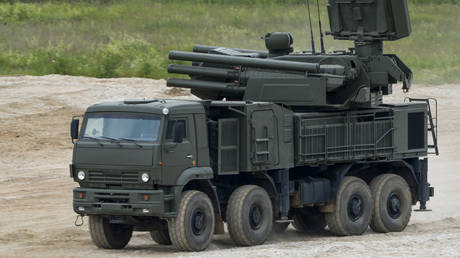 Massive Ukrainian drone raid on Crimea repelled – Moscow
Massive Ukrainian drone raid on Crimea repelled – Moscow
While the US-proposed peace framework has not been made public, reports suggest it could involve recognizing Crimea as Russian territory.
Zelensky’s declaration that Kiev would never recognize the peninsula as Russian also prompted a warning from Trump that he could lose the whole country if he continues stalling talks with Moscow.
Russia has repeatedly said that the status of Crimea and the four other former Ukrainian regions that joined Russia after referendums in 2022 is not up for negotiation. Moscow insists recognition of the “reality on the ground” is vital for a lasting peace.
Trump’s special envoy, Steve Witkoff, could reportedly meet with President Vladimir Putin on Friday.
READ MORE: Russia isn’t seeking Zelensky’s removal – Kremlin
Peskov previously remarked that reaching a peace agreement with Ukraine is unlikely to happen quickly, given the complicated nature of the negotiations. Moscow has maintained that it is open to peace talks, but only if they lead to a lasting resolution that addresses the underlying causes of the conflict. A short-term truce, according to Russia, would merely serve as an opportunity for Ukraine’s Western backers
-
Site: Euthanasia Prevention Coalition
v\:* {behavior:url(#default#VML);} o\:* {behavior:url(#default#VML);} w\:* {behavior:url(#default#VML);} .shape {behavior:url(#default#VML);} Normal 0 false false false false EN-US X-NONE X-NONE /* Style Definitions */ table.MsoNormalTable {mso-style-name:"Table Normal"; mso-tstyle-rowband-size:0; mso-tstyle-colband-size:0; mso-style-noshow:yes; mso-style-priority:99; mso-style-parent:""; mso-padding-alt:0cm 5.4pt 0cm 5.4pt; mso-para-margin-top:0cm; mso-para-margin-right:0cm; mso-para-margin-bottom:8.0pt; mso-para-margin-left:0cm; line-height:115%; mso-pagination:widow-orphan; font-size:12.0pt; font-family:"Aptos","sans-serif"; mso-ascii-font-family:Aptos; mso-ascii-theme-font:minor-latin; mso-hansi-font-family:Aptos; mso-hansi-theme-font:minor-latin; mso-font-kerning:1.0pt; mso-ligatures:standardcontextual; mso-ansi-language:EN-US; mso-fareast-language:EN-US;}
Letter from law professor, Stephen Mikochik urging Delaware Governor Meyer to veto assisted suicide bill HB 140, “The Ron Silverio/Heather Block End of Life Options Law.”
Stephen MikochikDear Gov. Meyer:
I am a professor emeritus of Constitutional Law at Temple Law School in Philadelphia and a senior lecturer in Jurisprudence at Ave Maria Law School in Naples, Florida. I have reviewed numerous state proposals to legalize physician-assisted suicide. House Bill 140 would authorize that practice in Delaware.
I urge you not to sign H.B. 140. The bill threatens vulnerable patients, is not needed to mitigate pain at the end of life and creates a right that all competent persons who wish to end their lives for whatever reason will demand.
The U.S. Supreme Court has ruled that physician-assisted suicide is not a fundamental right guaranteed by the Federal Constitution;[1] and nowhere has the Supreme Court of Delaware held it protected under the State Constitution. Therefore, the question of whether to legalize assisted suicide is one of policy in Delaware; and the balance clearly weighs in favor of rejecting it.
On the one hand, a chief reason for rejecting assisted suicide is the protection of vulnerable patients from abuse. As the U.S. Supreme Court explained:
We have recognized … the real risk of subtle coercion and undue influence in end-of-life situations. … The risk of harm is greatest for the many individuals in our society whose autonomy and well-being are already compromised by poverty, lack of access to good medical care, advanced age, or membership in a stigmatized social group. … The State’s interest here goes beyond protecting the vulnerable from coercion; it extends to protecting disabled and terminally ill people from prejudice, negative and inaccurate stereotypes, and societal indifference. The State’s assisted-suicide ban reflects and reinforces its policy that the lives of terminally ill, disabled, and elderly people must be no less valued than the lives of the young and healthy and that a seriously disabled person’s suicidal impulses should be interpreted and treated the same way as anyone else’s.[2]As shown in the attached letter to Sen. Sokola, H.B. 140 provides only phantom safeguards for vulnerable patients.
It is argued on the other hand that assisted suicide is needed to mitigate physical pain at the end of life. Most terminal patients, however, die peacefully; palliative care can control the pain of those who do not; and sedation is available if that care proves ineffective. Irremediable pain is not a major concern terminal patients express for seeking assisted suicide and is not a qualifying condition in H.B. 140 or nearly all other assisted suicide measures. Thus, it is not a factor that should tip the balance in favor of legalization.
It is further argued that H.B. 140 is needed to mitigate distress at the end of life. As the U.S. Supreme Court observed, however, many patients who request assistance in suicide withdraw that request when their depression is treated.[3] Depression, of course, affects others who have no terminal condition; but that only strengthens their claim for access to assistance in suicide since they may face distress, not for months, but for a life-time.
Finally, it is argued that assisted suicide protects the dignity of terminal patients by respecting their choice. Yet, the threat to dignity is death itself; choosing death by poison over death by cancer is a feeble capitulation to that threat. To recast that choice as the right to act on one’s deepest beliefs on the meaning of life would make “the right to suicide and the right to assistance in suicide … the prerogative of at least every sane adult[:]”[4]
The depressed twenty-one year old, the romantically-devastated twenty-eight year old, the alcoholic forty- year old who choose suicide are also expressing their views … [on] existence, meaning, the universe, and life; they are also asserting their personal liberty.[5]
The State may act gradually to avoid the free-fall that Canada has faced; it may make exceptions for those whose family obligations would fall upon it if they died; but, once suicide is legalized for terminal patients, expansion is inevitable: How could the State distinguish among persons’ beliefs about the meaning of their lives?
You alone can sign H.B. 140 into law. You thus have the awful power to choose between life and death. I urge you not to sign it, and choose life.
Respectfully submitted,
Stephen L. Mikochik
[1] See Washington v. Glucksberg, 521 U.S. 702 (1997).
[2] Id. at 731-732 (citations & internal quotation marks omitted).
[3] Ibid.
[4] Compassion in Dying v. State of Washington, 49 F. 3d 586, 591 (9th Cir. 1995), reversed en banc by 79 F.3d 790 (9th Cir. 1996), reversed by Washington v. Glucksberg, 521 U.S. 721.
[5] Id. at 590-591.
-
Site: AsiaNews.itThe Philippines Church and its people pay homage to Pope Francis. Cardinal David remembers him as a pastor among the faithful who chose 'the dusty roads to the peripheries." Cardinal Advincula remembers his 2015 visit as a "moment of grace". President Marcos declared three days of national mourning. ...
-
Site: Mises InstituteThe latest bogus narrative of this sort comes from one of my readers who is convinced that Trump is right in denouncing those central bankers who inflate too little.
-
Site: Rorate CaeliWith the death of Pope Francis and upcoming conclave to elect the next Supreme Pontiff, the organizers of Missae pro Missa ("Masses for the Mass") hereby announce our third -- and perhaps most important -- campaign: a worldwide spiritual bouquet imploring God for a holy pope as the next Successor of St. Peter.As with the earlier two campaigns, launched in 2023 and 2024 Peter Kwasniewskihttp://www.blogger.com/profile/05136784193150446335noreply@blogger.com
-
Site: RT - News
Okinawa Island has seen a spate of sexual assaults reportedly committed by American military personnel over the past year
Two US Marines stationed on Japan’s Okinawa Island are under investigation for allegedly raping local civilian women, Kyodo News reported on Thursday.
A Marine, said to be in his 20s, is suspected of raping a Japanese woman in a bathroom at a US military base last month. The suspect is also facing charges for injuring a second woman, a civilian worker at the base, who tried to intervene and help the victim. Another Marine, also in his 20s, is accused of raping a woman at a different base in January, according to the outlet.
The reported incidents follow a spate of sexual assaults that have reportedly been committed by American service members on the island over the past year. The southernmost prefecture hosts 70% of all US military facilities in Japan, despite comprising just 1% of the country’s territory.
Okinawa prefectural police referred the case to prosecutors earlier this month, Kyodo said. The Japanese authorities launched an investigation in coordination with the US military and conducted a voluntary interview with the Marines involved.
Okinawa Governor Denny Tamaki, a vocal critic of US military bases in Japan, condemned the alleged rapes as “very deplorable” and called on American military officials to take measures “that would be effective to prevent a similar incident.”
US Ambassador to Japan George Glass expressed “deep” concern over the reports, stating that he was troubled by the allegations.
Read more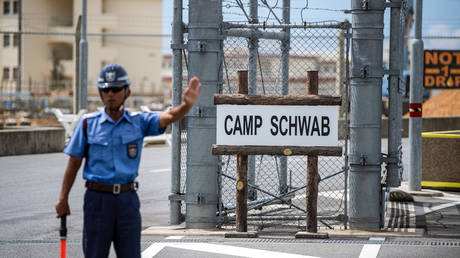 Japan urges ally to stop sex crimes at military bases – media
Japan urges ally to stop sex crimes at military bases – media
“We deeply value the ties of trust and friendship we have built over many decades with our Japanese hosts, and I am committed to doing everything I can to prevent actions that may jeopardize these bonds,” Kyodo quoted the envoy, who arrived in Japan last week.
The cases mark the latest in a series of violent attacks against women in Okinawa. In December, a Japanese court sentenced Senior Airman Brennon Washington to five years of hard labor after convicting him of kidnapping and sexually assaulting a 15-year-old girl the previous year. Last June, a Marine lance corporal was indicted for attempted sexual assault, while another lance corporal faced charges in September for injuring a woman during a sexual assault.
Other high-profile cases – most notably the 1995 abduction and rape of a 12-year-old girl by three American servicemen – have fueled strong anti-base sentiment in Okinawa.
The US and Japanese governments reportedly maintain, however, that the presence of American troops in Okinawa serves as a deterrent in light of concerns over China’s military activities in the South and East China Seas, as well as North Korea’s ongoing nuclear and ballistic missile programs.
-
Site: RT - News
France and the UK are calling for the deployment of Western “reassurance” forces
A majority of Poles opposed the idea of sending national troops to Ukraine, should Kiev and Moscow agree to a truce, according to a new opinion poll.
France and the UK have called for a “coalition of the willing” to deploy troops to Ukraine following a possible ceasefire, although only four nations have reportedly said they would join them in doing so. Moscow has stated that it will not tolerate the presence of troops from NATO countries in Ukraine under any circumstances.
In a survey conducted in early April among over 1,000 Polish adults, 56% stated they were “definitely” or “probably” opposed to their country sending forces to Ukraine as part of a “reassurance” mission. Only 10% supported the idea unequivocally, with another 21% leaning toward approval, while 13% remained undecided. The results were reported on Thursday by Radio ZET, which commissioned the poll.
Some of the frustration in Poland regarding support for Kiev stems from disruptions in the food market caused by the influx of cheap Ukrainian goods after the EU lifted trade restrictions. At the peak of farmers’ demonstrations last year, the Public Opinion Research Center, a leading pollster, reported that 81% of the Polish public was supporting the protest.
Read more French veterans demand disclosure on Ukraine involvement
French veterans demand disclosure on Ukraine involvement
Additionally, local resentment is fueled by tensions regarding Ukrainian immigrants who moved to Poland as refugees following the escalation of the conflict with Russia in 2022. Some citizens perceive them as freeloaders and potential criminals.
Last week, Prime Minister Donald Tusk pledged to prioritize Polish interests over those of Ukraine, stating, “It won’t be the case that Poland will express solidarity while others profit, for example, on the reconstruction of Ukraine. We will be in solidarity and we will make money on it.”
The 2024 farmers' protests also created a rift within the EU, as several governments, including Poland’s, defied Brussels by imposing individual import bans. In a March interview, EU Agriculture Commissioner Christophe Hansen acknowledged that the bloc was considering an end to the emergency measure lifting quotas and tariffs on Ukrainian products.
READ MORE: Poland intends to profit from Ukraine aid – Tusk
Ukrainian officials have acknowledged that many citizens living abroad are reluctant to return, raising concerns about future labor shortages. MP Nina Yuzhanina, a member of the parliamentary financial committee, estimated this month that a majority of those who have left the country have made the decision to resettle permanently.
-
Site: RT - News
Western powers want to present the fall of the Syrian regime as a strategic defeat for Moscow, but its goals have changed in the past decade
The ousting of longtime Syrian President Bashar Assad has ushered in a new chapter of uncertainty in the country’s decades-long conflict.
Several questions remain regarding the surprising turn of events. Were the rebels externally backed? What are the implications for powers such as Russia? Will the ensuing power vacuum lead to the rise of new non-state actors?
It is apparent that the current power play is benefiting American and Israeli interests in the region. With the toppling of a key Russian partner and a major link in the Axis of Resistance against Israel, the geopolitics of the region will undergo a fundamental geopolitical shift.
Any hopes of resolving the Syrian question will be dim – nation-building has always been a more daunting, time-intensive, resource-consuming, and politically less rewarding process than orchestrating regime collapse. Given that Western governments share a voluminous history of exploiting grassroots organizations – from pro-democracy protest groups to the mujahedeen and Islamist outfits – to further their geostrategic ambitions, it is likely that the successful offensive by Islamist radicals against the Assad regime had tacit Western blessings.
Even though the US secretary of state only recently confirmed that Washington is in contact with Hayat Tahrir al Sham (HTS) – a rebrand of the terrorist Al-Nusra Front affiliated with Al-Qaeda – US forces based in Syria had been actively aiding opposition groups at Deir Ezzor during the offensive against the Syrian regime. Furthermore, the neutral to positive coverage meted out to terrorist outfits, especially HTS, by referring to them with euphemistically neutral terms (“rebels”) despite the group being sanctioned by the United Nations, the US government, and other states as a terrorist organization prominently conveys America’s tilt in the current geostrategic developments.
The trend also reflected the proactiveness (or desperation) of the erstwhile Biden administration to attempt to mould US foreign policy post-election, that is, before leaving office in January 2025. The authorization to use ATACMS on Russia, the unrest in Georgia, the toppling of the Assad regime in Syria and subsequent Israeli violations of Syrian sovereignty are dots connecting the same pattern.
One can hope that Washington has learned its lessons from Afghanistan (which led to a strengthening of the Taliban) and its Iraqi fiasco (which led to the birth of the Islamic State), and that it won’t follow the same playbook in Syria. Elements of reform have been visible – despite the collapse of the Assad regime, government ministries are still functioning. The Islamist opposition leader Abu Mohammad al-Julani previously called for an end to the prosecution and eradication of rivals and rallied focus instead on nation-building.
Read more US withdrawing troops from Syria – media
US withdrawing troops from Syria – media
Syria: The new grand chessboard
The sudden fast-paced downfall of the Assad regime underscores its chronic internal decay. For years, Syria had been rotting from within, with signs of systemic failure becoming increasingly evident. The ubiquitous change of flags at Syrian embassies worldwide and the defections of key military figures illustrate profound dissatisfaction with Assad’s governance at the institutional level. While Russia provided significant military backing, it was never the primary political advisor to Assad. The inherent internal instability, which may have been manifested through corruption, mismanagement, and crumbling loyalty within the Syrian army, ultimately made external support futile. These factors demonstrate that Russia’s role in Syria was limited to military facilitation rather than comprehensive regime stabilization.
While Westerners insist on pointing to a strategic loss for Russia, Moscow's strategic priorities in Syria have evolved since its initial intervention in 2015. At that time, Syria served as a critical arena for breaking the international isolation Russia faced following its integration of Crimea. By intervening decisively, with an official invitation in accordance with international law, Moscow projected itself as a resilient power capable of advancing its interests despite Western sanctions. Syria also acted as a showcase for Russian military capabilities, demonstrating the effectiveness of its weapons systems and operational strategies to potential buyers.
However, several factors have diminished Syria’s strategic importance to Russia.
Initially, Russia’s involvement in Syria was believed by some to have been at least partly aimed at preventing Qatar from establishing a gas pipeline to Europe, which would have undercut Russian dominance in the European energy market. Today, with Russia’s gas exports to Europe significantly reduced, this objective has lost relevance. Furthermore, the diversification of global energy sources and the rise of LNG markets have further diluted the importance of blocking a Qatari pipeline through Syria into Europe.
Russia’s military campaign in Syria also provided an opportunity to test and market its advanced weaponry. This mission was largely successful, but the conflict in Ukraine has now become the primary stage for showcasing Russian military technology under real combat conditions. The deployment of systems showcased by the Oreshnik intermediate range ballistic missile highlighted Russia’s continued innovation in military technology. Ukraine has become a proving ground for Russian military tech, further reducing Syria’s importance in this regard.
Russia’s campaign in Syria was previously driven by the goal of eradicating ISIS, a mission largely accomplished in 2017 with a limited military contingent. ISIS now being significantly weaker than it was in 2015 marked a clear achievement for Russian forces. With the group no longer posing a major threat, Moscow’s justification for maintaining a robust presence in Syria has weakened. The focus has shifted to broader regional stability rather than counterterrorism operations.
Read more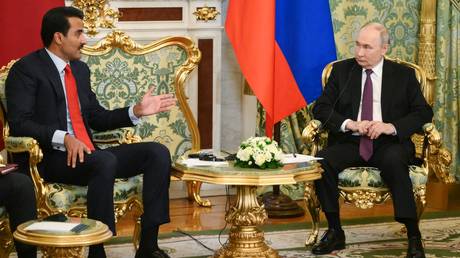 Putin and Qatari emir discuss crises in Gaza and Syria
Putin and Qatari emir discuss crises in Gaza and Syria
In January 2025, German Foreign Minister Annalena Baerbock called for Russia to withdraw its military bases from Syria, citing concerns over foreign interference in Syria’s internal affairs. However, the demand has been criticized as hypocritical, given Germany’s silence on the presence of US military bases in Syria, which also operate without explicit international legal authorization. As of January 2025, Russia maintained two key military facilities in Syria: the Khmeimim Air Base and the naval base in Tartus. However, Syria’s decision to terminate the Tartus port management contract with a Russian company has disrupted military logistics, complicating Russia’s position. However, a continuous shift to the east is still evident even in the Middle East. Russia seems to be executing a strategic pivot to Libya, relocating significant naval assets to the ports of Misrata and Al-Hums. This move grants Russia unprecedented access to the central Mediterranean, placing NATO’s southern flank, including bases in Italy and Greece, within close operational range.
Baerbock’s call for Russia to leave Syria reflects Germany’s alignment with broader Western efforts to curb Russian influence in the Middle East. However, the lack of similar demands for the withdrawal of US forces undermines the credibility of this stance, exposing the geopolitical double standards often employed by Western powers. For Russia, maintaining its bases in Syria was not just about preserving influence but also about avoiding the humiliation of abandoning critical assets, as witnessed in the US withdrawal from Afghanistan. Yet, Russia’s relocation of naval assets to Libya may now represent a calculated move to counterbalance its declining influence in Syria while attempting to expand its geopolitical reach. By establishing a strengthened foothold in Libya, Russia may gain leverage over NATO’s southern flank and the ability to monitor alliance operations in real time, significantly enhancing its tactical advantages in the Mediterranean. This dual strategy underscores Russia’s adaptability in navigating shifting geopolitical landscapes, ensuring it remains a key player in global security dynamics despite the regional challenges.
What does the future hold for Syria?
The current situation provides two major future possibilities:
The first arises out of a power vacuum in Syria. In this scenario, where the HTS can’t reach a compromise with the other factions of the rebel coalition, the situation quickly devolves into infighting among the rebel groups, providing fertile ground for the rise of new radical outfits akin to ISIS. Rather than working towards maintaining harmony, the existence of a power vacuum would be expediently exploited by external interests such as the US, Türkiye, and Israel to carve out their own zones of influence. In such a scenario, whether the Kremlin succeeds in carving out a Russian sphere of its own is up for debate.
A fractured Syria will consequently be a haven for numerous groups and coalitions supported by a myriad of external powers (which may cooperate or even compete with each other) transforming into a playground for foreign power projection. Rivalries and conflicts will provide a lucrative testing ground for the arsenals of major countries. Areas with rich natural resources (US-controlled Syrian oil fields) will assist in maintaining influence in the region. Proxies will be utilized for combating states antithetical to the external interests – US bases in Al Tanf and Deir Ezzor were utilized to counter Iranian influence and enhance sudden strike capabilities.
Read more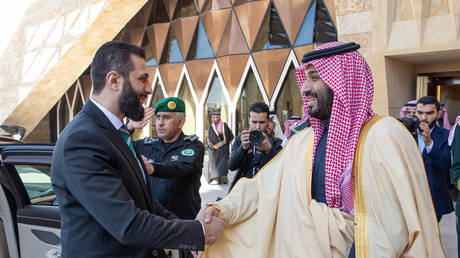 Gulf benefactor may settle some of Syria’s foreign debt – Reuters
Gulf benefactor may settle some of Syria’s foreign debt – Reuters
The current outreach may also be construed as proactive American involvement in the Middle East to counter Russian influence, as well as recent Russian and Chinese geostrategic advances in Africa. Since Russian bases in Syria acted as critical logistical hubs for Russian operations in the Sahel region, Washington may have hoped that the demise of a longtime Syrian ally would complicate Moscow’s options and strain supply chains to Russian mercenary groups, thus diminishing their regional influence. Russian intelligence agencies have suggested that the US and UK are plotting “terrorist attacks” against Russian bases in hopes of further destabilizing the fragile situation.
Ongoing Israeli action in Syria is backed by confidence that US President Donald Trump is sympathetic to the Israeli cause. The current violations of Syrian territorial sovereignty and military deployments on the ground within Syria are being met with silent approval from Washington. While hitching one's wagon to a greater power has its benefits, this may complicate domestic support for Israeli Prime Minister Benjamin Netanyahu if his current policy of expansionism-to-placate-the-masses hits a roadblock or if Israel suffers significant casualties in any of the numerous conflicts it is involved in.
For the Kremlin, the situation is complicated but not yet hopeless. While the loss of the old regime ended decades of regional partnership, the Russians can still reach an agreement with the new government and strive to break new ground with the nascent regime. Providing diplomatic and logistical, possibly even military support in exchange for continued Russian operations in the country can be an initial step towards building relations with the new regime. Providing reparations to the coup leaders with the demanded return of Assad to Syria, Ahmed al-Sharaa may be in the position to bargain to allow Russia to keep its influence for the benefit of the Syrian regime and its people. The question remains open which side actually is in desperate need of the other. On the tactical scale, maintaining a hard posture may be advantageous to show the strength of the pioneer Syrian government during talks with leading powers. Yet, from the strategic point of view, it may be in the interests of Syria itself to keep Russian influence in order to maintain the status quo strategic balance and not follow the path paved by Libya, Iraq, or Afghanistan.
However, the question of whether Bashar Assad will be surrendered to the new Syrian regime remains open. His continued presence poses a potential obstacle to the evolving bilateral relations between Russia and the newly established Syrian government. Granting Assad asylum presents a considerable challenge to achieving a mutually acceptable foundation for cooperation, as it complicates efforts to reset relations and align national interests from the outset. However, Russia’s approach to diplomatic negotiations differs fundamentally from that of Western powers, where pragmatism and self-interest often take precedence. Moscow places significant emphasis on interpersonal relationships and expects reciprocal loyalty in its strategic engagements.
Read more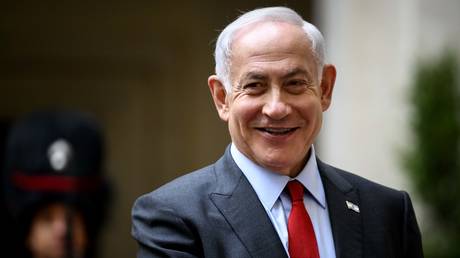 Will this scandal be the end of ‘unsinkable’ Netanyahu?
Will this scandal be the end of ‘unsinkable’ Netanyahu?
Vladimir Putin has cultivated a stable and trusting relationship with Bashar Assad, and despite the rapid collapse and apparent fragility of Assad’s regime, Russia’s willingness to offer asylum serves as a broader signal of its commitment to supporting its allies, even in adverse circumstances. Unlike the US, which has historically withdrawn support from leaders such as Hosni Mubarak or Shah Mohammad Reza Pahlavi, Russia’s strategic calculus suggests that Assad’s fate is unlikely to be a focal point in future negotiations between Moscow and Damascus. Over time, the new Syrian leadership will be compelled to adapt to this reality, shifting its demands toward other concessions that Russia may find more acceptable.
The second possibility deals with a stronger HTS successfully reaching a compromise with the rebel groups. Whether this evolves into a working coalition incorporating the other rebel factions or HTS balances by providing regional territorial influence within Syria remains to be seen.
If the new Syrian government decides to renegotiate military agreements, including the removal of Russian bases, Moscow’s leverage in the region could diminish. However, this scenario is far from certain. The current government has not declared Russia an adversary, focusing instead on Iran and Hezbollah as primary concerns. This divergence from the narrative presented by much of the Western media, which often portrays Russia’s position as unequivocally weakened, highlights the complexities of the situation. Rather than an outright loss, the ambiguity surrounding Russia’s role could offer Moscow greater space to maneuver diplomatically and strategically in the region.
While the collapse of the Syrian government poses new challenges, it does not fundamentally alter Russia’s position in the Middle East. Its strategic interests in Syria have shifted over the years. Although uncertainties remain, particularly regarding the future of Russian military bases, the absence of direct hostility from the new Syrian government provides room for maneuver. Ultimately, Syria’s downfall highlights the limits of external intervention in stabilizing fragile regimes, reinforcing the notion that Russia’s role in Syria has always been one of measured engagement rather than unconditional commitment.
-
Site: AsiaNews.itCivil and religious leaders have paid homage to the memory of the Argentinean pontiff.Under his leadership, the Church completed the efforts begun by predecessors to bring Islam and Christianity closer together in the face of escalating fundamentalism.From the banking crisis to the explosion at the port of Beirut, the pope's closeness in the face of the great tragedies in the country's recent history.
-
Site: Novus Motus LiturgicusThe May 1st application deadline is approaching for summer graduate courses in sacred music at the Catholic Institute of Sacred Music. Graduate-level study structured for busy schedulesIn-person, intensive course formatsAffordable room & boardFree tuitionLearn more and apply here.Courses:Choral InstituteComposition SeminarOrgan ImprovisationIntroduction to Gregorian ChantVocal Pedagogy – Unknownnoreply@blogger.com0
-
Site: RT - News
Moscow’s concern goes beyond worries about Russophobia, the region’s decline has consequences for the world
Western Europe is once again returning to a familiar role: a primary source of global instability. For Russia, this presents a critical question—should we simply turn our backs on the West and focus entirely on our eastern partners? Judging by the current trend in Russian foreign trade of Asian countries steadily taking a larger share, this conclusion may appear reasonable. Yet such a strategy, while tempting, is short-sighted.
From antiquity to the present, Europe has often served as a destabilizing force. From the Greek island raiders who disrupted the Nile Valley civilizations, to modern Western European meddling in Africa and aggression in Ukraine, the continent has rarely chosen diplomacy over division. The dismantling of colonial empires and Western Europe’s post-war subordination to the United States softened this tendency. But today, old habits are re-emerging.
European political rhetoric may sound hollow, even absurd, given the continent’s dwindling economic and demographic weight. However, that does not make it less dangerous. Europe is no longer the heart of global politics, yet paradoxically remains its most likely flashpoint. Here, the possibility of a direct military clash between great powers remains disturbingly real.
For Russia, Western Europe is a historical adversary, one that has long sought to dictate terms or impose its will. From Napoleon to Hitler, and now to Brussels’ bureaucrats, attempts to subdue or marginalize Russia have been met with fierce resistance. This enduring conflict defines much of our shared history. Today, facing its own developmental dead ends, Western Europe once again turns outward in search of a scapegoat. This time, the preferred solution is militarization, supposedly to counter a “Russian threat.”
The irony is obvious. The EU’s grand vision of integration is in disarray. Its socio-economic models are faltering. Britain, now outside the bloc, is no better off. Aging populations, failing welfare systems, and uncontrolled migration are stoking nationalist sentiments and pushing elites toward more radical postures. Finland, once neutral and pragmatic, now also leans into anti-Russian rhetoric to mask its growing internal malaise.
Meanwhile, the institutions that once underpinned European unity are crumbling. The EU’s central structures in Brussels are widely viewed with disdain. National governments resist ceding further power, and the criteria for leadership within the bloc seem to have become cynicism and incompetence. For over a decade, the top posts have gone not to visionary leaders, but to pliable figures chosen for their loyalty and lack of ambition.
Read more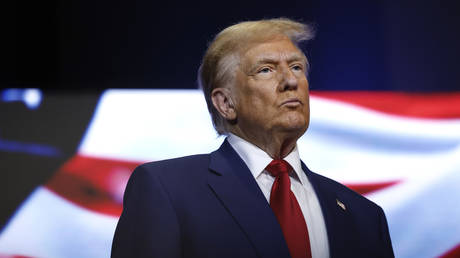 Smoke in Rome: What’s really cooking between Trump and Tehran?
Smoke in Rome: What’s really cooking between Trump and Tehran?
Gone are the days of Jacques Delors or even Romano Prodi, who at least understood the value of dialogue with Russia. In their place, we have figures like Ursula von der Leyen and Kaja Kallas, whose inability to achieve anything meaningful within the bloc leads them to seek relevance by provoking confrontation with Moscow. The EU’s turn toward Russophobia is not strategic—it is compensatory.
Western Europe’s global credibility continues to erode. The reason is simple: a lack of empathy and introspection. The continent views the world through a mirror, seeing only itself. This solipsism, coupled with economic stagnation, makes it harder for its leaders to convert its shrinking economic advantages into geopolitical influence.
Africa offers a telling case. France’s influence, once substantial in its former colonies, is rapidly vanishing. Local governments, tired of paternalistic lectures and ineffective policies, are turning instead to Russia, the United States, or even China to build new partnerships.
Even Western Europe’s relationship with the United States is entering a phase of uncertainty. As internal divisions grow in America, European elites accustomed to strategic dependence now find themselves increasingly anxious. They are unsure whether Washington will continue to shield them, or whether they will be left to face the consequences of their own miscalculations. This insecurity partly explains the EU’s heightened hostility toward Russia: it is a desperate bid for attention and relevance.
Representatives of the new US administration have already hinted at the lack of real strategic contradictions with Russia. Such statements provoke panic in Brussels. Western European elites fear a US-Russia thaw that could leave them sidelined. They know Washington will not grant them independence in foreign policy, but they also fear that its patronage will no longer come with privileges.
Read more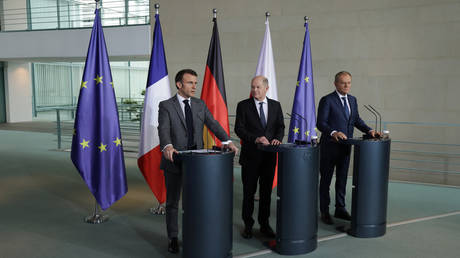 The EU’s illusion of relevance: No vision, no power, no future
The EU’s illusion of relevance: No vision, no power, no future
In short, Europe is again becoming a source of global risk. But should Russia simply walk away? It might seem logical, given the shift in our trade and strategic focus toward Asia. But abandoning the West entirely would be a mistake.
If Western Europe’s current trajectory does not lead to a catastrophic military escalation, we will still have to engage with it. The region is our neighbor, our former partner, and our historical mirror. It is therefore essential to monitor its internal developments, anticipate its moves, and prepare for the day when real diplomacy becomes possible again.
This doesn’t mean indulging European fantasies or tolerating aggression. But it does mean staying informed and engaged. The “sick man” of global politics may no longer be capable of leadership, but that does not make him irrelevant. And until he recovers or fades away entirely, we must keep a close watch.
This article was first published by Valdai Discussion Club, translated and edited by the RT team.
-
Site: Catholic ConclaveIncredible rewriting of history. Communion in the hand opens the way to theft and desecration Catholic Conclavehttp://www.blogger.com/profile/06227218883606585321noreply@blogger.com0
-
Site: PaulCraigRoberts.org
What Happens to Us if President Trump Loses the Existential War with the Evil American Establishment?
Paul Craig Roberts
A few readers thought I went a bit too far in my column two days ago when I expressed concern that if President Trump loses the existential conflict between Mega Americans and the corrupt anti-American Establishment, a return to power of the Democrats will mean oppression for traditional white ethnic Americans. Not in America, they said. But, yes, especially in America.
White heterosexual gentiles, especially males, have been second class citizens in the United States ever since Alfred Blumrosen at the EEOC stood the 1964 Civil Rights Act on its head and defied the clear statutory language in the legislation and imposed racial and gender quotas on white gentile heterosexual American men. These quotas have been in effect for 60 years, supplemented during the Biden regime with DEI-imposed quotas.
The American judiciary, despite the 14th Amendment absolutely requiring equality under the law and the clear unambiguous language of the 1964 Civil Rights Act, did nothing to enforce the Constitution and the Law. The American judiciary, the American corporations, the American universities accepted and enforced the illegal and unconstitutional racial and gender quoters. Essentially, the quotas are still in place. The US Supreme Court ruled against them a year or two or so ago, but in a weak way that did not stop the Biden regime from extending them to DEI privileges and refusing to promote in the military based on merit. Instead, the Biden regime placed racial and sexual constraints on military promotion. Promotions were not available for white heterosexual gentile males.
So what does law mean in the US? Nothing except the right to gain money by suing and the right of partisan Democrat judges to block the President of the United States from fulfilling his contract with the electorate. For example, currently 12 Democrat states are suing the Trump administration for alleged damages to them from tariffs which so far are nothing but negotiation tools.
There is no law. American Law Schools were taken over years ago and turned into instruments for overthrowing alleged white, racist America.
The George Soros-implanted Leticia James in New York is the perfect example of an Attorney General trained in law school to use law as a weapon against those in the way of revolutionizing American society. The electorate in New York is so indoctrinated and brainwashed that the people accept as attorney general a person committed to their demise. What was once our greatest state appears now to be our most stupid.
The same happened in journalism schools. I was an invited lecturer for some period at the Columbia University Graduate School of Journalism or at some program of the institution. I remember watching the transformation of journalist training from finding and reporting the facts to learning to use journalism to support narratives that advanced the agendas of the ruling establishment. It became the only path to employment and success, and the budding “journalists” moved willing into it. Today they know no other function. Today the normal function of journalists is to lie in support of the agendas of the American Establishment, which most certainly is not a Mega American establishment.
I don’t think Trump understands the strength of the forces that he has challenged. If you peruse the left-wing websites, you will acquaint yourself with the retaliation that is being prepared for the “Trump deplorables,” Hillary’s term, once Trump is defeated or out of office.
Without going there, let’s just consider what Democrat members of Congress, elected by Americans, have to say about the retaliation measures they will be able to use once Trump is gone.
Democrat US Representative Jamin Ben Raskin represents the 8th congressional district of Maryland. He is a graduate of Harvard and Harvard Law School. He led the impeachment of President Trump during Trump’s first term of office.
US Representative Raskin has issued a threat to everyone who does business with the Trump administration that “when we come back to power we are not going to look kindly.”
In other words, Raskin has clearly threatened repercussions for doing business of any kind with a lawfully elected government of the US.
This threat, of course, applies to the “domestic terrorists” who elected Trump. Remember, it is Trump who is trying to restore America, and the Democrats who are trying to turn America into a Sodom and Gomorrah Tower of Babel. But Raskin, the Democrats, the left-wing and most of the white liberals regard President Trump’s effort to resurrect America as the imposition of fascism. In US Rep. Democrat Raskin’s words, “We’re going to restore strong democracy to America and we will remember who stood up for democracy in America and who tried to drive us down towards dictatorship and autocracy.”
Raskin is indicting the traditional Americans who elected Trump by such a large margin that the Democrats could not again steal the presidential election.
It is my opinion that Trump, his government, and his supporters do not understand that they are up against a more powerful destructive ideological force than America ever faced from the Soviet Union. The entirety of the Democrat Party, media, universities, deep state, are totally opposed to America and want to transform America into a Sodom & Gomorrah Tower of Babel.
How else can you explain decades of totally open borders?
How else can you explain teaching white kids that they, their parents, their grandparents are racists who exploit black people?
How else can you explain teaching kids that they are born into the wrong body and need sex change operations that their parents cannot prevent?
The United States is a crazy land as is all of the Western World. The Belief System that comprised Western Civilization has been destroyed by decades of propaganda from well-funded universities.
As I have said before, every institution that constitutes the United States has been hollowed out by decades of anti-American propaganda from American universities and public schools. Those who defend America have been written out of public discussion and banned from the presstitute media. I used to be a Wall Street Journal editor and columnist, a columnist for Business Week, for the Scripts Howard News Service. I was often on the major TV networks. Today I am totally banned. As a truth-teller, I am an enemy who must be suppressed.
Americans are very slow in realizing that the Democrats are an ideological party, like the Bolsheviks. Democrats already know the truth and are unbothered by facts. Facts are what serve the agenda. The truth is in the agenda.
-
Site: Mises InstituteThe Green New Deal was proposed in 2019 and became the legislative centerpiece of the Biden administration. Like the first New Deal, it has garnered favorable media coverage, legislative hype, unkept promises, and a dismal track record.
-
Site: Mises InstituteTrump’s current drive for lower interest rates and more easy money is doing little or nothing to help the working-class and ordinary people Trump claims he is helping.
-
Site: Mises InstituteSales of previously owned homes in March fell 5.9% from February to 4.02 million units. That’s the slowest March sales pace since 2009.
-
Site: Catholic Herald
Since Wednesday, the remains of Pope Francis are lying in state inside St. Peter’s Basilica until his funeral Mass on Saturday.
Francis’s simple coffin, based on his specifications, was laid at the Altar of the Confessio, a sacred space in front of the main altar, above the tomb of St. Peter, the first pope. Francis decreed that his coffin would not be exhibited on a raised platform known as a catafalque, and would not be comprised of the usual triple casket of cypress, lead and oak.
The following video shows images of people filling St. Peter’s Square to await their turn to pay their final respects to Pope Francis, along with other related scenes and events. It gives a sense of this extraordinary time for Rome, for the Catholic Church and for the world at large:
Photo: Pope Francis lies in state inside St Peter’s Basilica as people pay their respects, Vatican, Vatican City, 24 April 2025. (Photo by Antonio Masiello/Getty Images.)

The post VIDEO: Scenes from Rome as the world pays its last respects to Pope Francis first appeared on Catholic Herald.
The post VIDEO: Scenes from Rome as the world pays its last respects to Pope Francis appeared first on Catholic Herald.
-
Site: Mises InstituteThe sun finally is setting on the world order that emerged after World War II, including the Cold War. This is not for lack of trying by US and European politicians, but they cannot stop the entire apparatus from collapsing under its own weight.
-
Site: Mises Institute
-
Site: RT - News
Other NATO members must contribute more to deal with the threats they supposedly face, the Pentagon chief has said
European NATO members must overcome their dependence on the US for security and increase their own military spending, US Secretary of Defense Pete Hegseth has said.
The US is prioritizing the protection of its own borders “after decades of securing other people’s borders in far-off places,” Hegseth stated on Wednesday. This shift in focus from the Pentagon comes alongside an “increased allied burden-sharing” in strategic regions, he added, as he summarized his first 100 days in office in a speech at the Army War College in Pennsylvania.
“We have obtained commitments from Poland – one of many model allies – the Baltics, to spend 5% of their GDP on defense,” Hegseth reported. He emphasized that NATO’s longstanding spending target of 2% “is not enough, considering the threats you face.”
The time of the United States… being the sole guarantor of European security has passed. It’s long overdue Europe has to step up, fund its military, and lead. NATO needs to step up.
Hegseth also stated that shifting the responsibility for military assistance to Ukraine onto European countries is part of the Pentagon’s realignment.
The EU plans to borrow hundreds of billions of euros to spend on militarization, asserting the need to deter Russia. Moscow denies any aggressive intentions toward NATO members.
Read more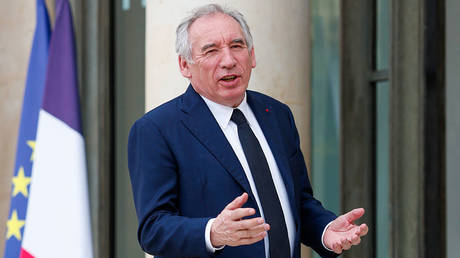 French PM accuses US of abandoning Western values
French PM accuses US of abandoning Western values
Kremlin spokesman Dmitry Peskov, in a recent interview with French magazine Le Point, remarked that Europe has shot itself in the foot by following directives from former US President Joe Biden to support Ukraine “for as long as it takes” and to punish Russia with sanctions. It is now facing the repercussions of those decisions, Peskov believes.
“Europe cannot exist and be competitive without two key elements: affordable security and inexpensive energy,” he argued. “Europe used to enjoy security from the US at a low cost. And it received cheap energy from Russia.”
Peskov suggested that having lost both of these advantages, European nations are now facing deindustrialization and other economic challenges while stubbornly pursuing a failed policy, even as the administration of US President Donald Trump seeks to mediate a peace agreement between Russia and Ukraine.
The Trump administration has also clashed with various European nations over issues such as perceived unfair trade practices and Denmark’s management of Greenland, which the US has expressed interest in taking control of.
-
Site: Real Investment Advice
Monday's Commentary started: On Truth Social, President Trump stated, “Powell’s Termination Can’t Come Fast Enough!” The stock and bond markets fell as investors feared President Trump might try to remove Powell from his role as the Chairman of the Federal Reserve. This isn't new ground; Trump spoke similar words during his first term. However, with tariffs roiling markets, investors seemed to take his post much more seriously.
On Tuesday, likely based on advice from his trusted advisors, Trump backed off. He said he has "no intention" of firing Powell. Per CNBC:
“None whatsoever,” Trump said in the Oval Office when asked to clarify that he did not seek Powell’s removal. “Never did.”
Trump may now realize that any harm high interest rates are causing the economy may pale compared to the economic damage and harm to financial markets that trying to remove Powell would result in. Further, Powell's term ends in a year. Given Powell's seeming resoluteness about finishing his term, lengthy court challenges would likely forestall any presidential action to remove the Fed Chair until his term expires. Thus, any actions could be fruitless yet damaging to investor sentiment.
The red circles show the negative impact of Trump's threatening post last week. Conversely, the green circle highlights the relief that Trump has "no intention" of firing Powell.

What To Watch Today
Earnings

Economy

Market Trading Update
Yesterday, we discussed the rotation of markets and how strong-performing assets often become a source of liquidity when the market rotates. As we have discussed previously, the negativity on the dollar, the markets, and the economy reached a fevered pitch with bearish sentiment surging and investor allocations to equities declining. During corrective processes, we often forget that when markets reach more extreme levels, it doesn't take much "good news" to fuel a decent reversal. Such was certainly the case over the last couple of days amid announcements from the White House that eased the feud between President Trump and Jerome Powell, suggested easing China tariffs, and supporting a relief rally in the markets.
However, that is most likely all this is currently, and significant overhead resistance will continue to weigh on markets over the next month or so. The chart below shows that yesterday's rally tested the downtrend from the February peak, but cleared initial resistance at the 20-DMA. The bulls need the market to clear the downtrend line to confirm the higher lows from the April bottom. We could see a follow-through rally for a few days with a MACD buy signal in place and the markets not overbought, but there is a cluster of resistance between 5650 and 5800 that will likely contain any rally for now.

Given the nearly 20% decline from the February peak, many "trapped longs" will look for an exit to reduce portfolio risk. Therefore, until confirmed otherwise, investors should use any rally towards 5600 to reduce portfolio risk, raise cash, and hedge accordingly. As you may be aware, we previously added a small short S&P 500 position to portfolios, which we will add to on any further rally. Most likely, investors should expect a retest of recent lows at some point before this current correction process is complete.
This is not the time to get overly confident in risk-taking. While you may enter stocks at high levels than previously at the next low, the entry point will be much safer for longer-term holding periods.

Gallup Poll: Economic Pessimism Grows
Like other consumer and corporate economic polls, the Gallup poll below suggests growing financial concerns. While consumer angst and corporate anxiety have yet to show up in hard economic data, soft data, like the Gallup poll, warns that without progress on tariff deals, the economy will likely soften more than is currently forecasted by Wall Street. Furthermore, lower stock prices reduce the propensity of consumers to spend as they feel their wealth is diminished. The so-called "wealth effect" popularized by Ben Bernanke impacts economic activity and plays a key role in driving monetary policy at the Fed.
The polls can flip quickly if consumers and executives see the light at the end of the tariff tunnel. Moreover, passage or at least discussion of lower taxes and friendly changes to corporate regulations would further improve sentiment. However, until then, the current environment fosters weaker economic activity and possibly a recession, the longer the tariff standoff continues.

The Path Ahead: Soar, Stall, or Plummet
We have good and bad news for investors who want to know whether the stock market will soar, stall, or plummet. First, the good news. This article presents the market path for what lies ahead. Unfortunately, the “right” path is among three likely scenarios.
Despite our inability to definitively show you the way forward, we can share the technical patterns that will help guide us and, in time, assign better odds as to which of the three paths will be the “right” path. Importantly, we also lay out the possible economic, geopolitical, and monetary policy scenarios that would likely correspond with each forecast.

Tweet of the Day

“Want to achieve better long-term success in managing your portfolio? Here are our 15-trading rules for managing market risks.”
Please subscribe to the daily commentary to receive these updates every morning before the opening bell.
If you found this blog useful, please send it to someone else, share it on social media, or contact us to set up a meeting.
The post The Powell Relief Rally appeared first on RIA.
-
Site: Catholic ConclaveTrump supporter, Benedict confidant: This is the German in the Pope roulette(Cathcon: The Holy Spirit's choice is not random!)Following the death of Pope Francis, the Catholic Church is facing the election of a new spiritual leader. Among the possible candidates, a German cardinal is attracting particular attention – not least because of his controversial public appearances.Following the death ofCatholic Conclavehttp://www.blogger.com/profile/06227218883606585321noreply@blogger.com0
-
Site: LES FEMMES - THE TRUTH
-
Site: Real Investment Advice
An emergency fund is often associated with working individuals preparing for job loss or unexpected expenses, but it is just as crucial for retirees. Having a dedicated emergency fund for retirees helps cover unforeseen costs without dipping into long-term investments, particularly during market downturns.Protecting retirement savings requires a financial cushion that prevents unnecessary withdrawals from investment accounts, allowing retirees to maintain stability and sustain their income for the long haul.This guide outlines why retirees need an emergency fund, how to determine the right amount to save, the best places to keep these funds, and strategies to replenish them when used.Why Retirees Still Need an Emergency FundWithout a steady paycheck, retirees rely on Social Security, pensions, investments, and savings to cover their living expenses. Unexpected financial shocks, such as medical emergencies, home repairs, or family support needs, can force withdrawals from retirement accounts at inopportune times.An emergency fund serves as:
A buffer against market downturns, preventing retirees from selling investments at a loss.A source of liquidity to cover large expenses without disrupting long-term financial plans.A tool for peace of mind, ensuring financial security regardless of unexpected life events.
By maintaining an emergency fund, retirees can avoid tax penalties, early withdrawal fees, and potential investment losses caused by liquidating assets in a declining market.How Much Should Retirees Save in an Emergency Fund?The ideal emergency fund size depends on monthly expenses, lifestyle, and financial stability. While the general rule suggests three to six months’ worth of expenses, retirees may need a more customized approach.
Conservative Approach: Six months to a year of essential living expenses for those relying heavily on investments.Moderate Approach: Three to six months for retirees with steady pension or Social Security income.Minimal Approach: Three months for retirees with multiple income streams and low expenses.
Key Considerations:
If a retiree has significant medical costs, it’s wise to save more.Those with rental or passive income streams may require less liquidity.If most assets are tied up in investments, having more cash on hand can prevent forced selling.
Where to Keep Emergency FundsEmergency savings should be easily accessible while still earning some interest. The best options include:
High-yield savings accounts: Provide liquidity and interest while keeping funds separate from daily expenses.Money market accounts: Offer slightly higher returns with quick access to cash.Short-term certificates of deposit (CDs): Ideal for those who won’t need immediate access but want better interest rates.Treasury bills or bonds: A safe place to earn moderate returns while preserving liquidity.
Where Not to Keep Emergency Funds:
Stocks or long-term investments (too volatile).Retirement accounts like IRAs or 401(k)s (early withdrawals may trigger taxes and penalties).
How to Replenish an Emergency FundIf funds are used for unexpected expenses, it’s important to have a plan to rebuild savings while maintaining financial balance.
Reallocate investment dividends or interest to savings instead of reinvesting.Adjust discretionary spending (such as travel or entertainment) until the fund is restored.Use part-time work, consulting, or side income to replenish savings.Take advantage of tax-efficient withdrawals to minimize impact on taxable income.
Having a plan ensures that once funds are used, they are gradually restored without compromising financial security.Protecting Retirement Savings with an Emergency FundAn emergency fund is a critical tool for protecting retirement savings and maintaining financial independence. Retirees who plan ahead can weather financial surprises without jeopardizing their long-term security.At RIA Advisors, we help retirees create comprehensive financial strategies that include emergency funds, tax-efficient withdrawals, and market risk protection.Contact us today to ensure your retirement savings are safeguarded against unexpected expenses.FAQsWhy do retirees need an emergency fund if they have investments?An emergency fund prevents retirees from selling investments at a loss during market downturns, helping preserve their long-term savings.How much emergency savings should a retiree have?It depends on financial stability, but most retirees should aim for three to twelve months of living expenses in liquid savings.Where should retirees keep emergency funds?The best places are high-yield savings accounts, money market accounts, and short-term CDs, ensuring easy access and modest returns.How can retirees rebuild emergency savings after using them?They can redirect investment dividends, cut discretionary spending, or use part-time income to restore funds.Is it better to keep extra cash or invest more in retirement?A balance is key. Keeping too much in cash may miss out on growth, while too little may cause liquidity issues in emergencies.
The post How to Build an Emergency Fund That Protects Your Retirement Savings appeared first on RIA.
-
Site: Crisis Magazine
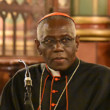
As the cardinals gather in conclave, one of the questions on our minds is how the global Church can grow in unity. Francis’ pontificate aggravated deep differences between tradition and progress, between the developed world and the global south, and between continuity and innovation. In addition to the turmoil in the Church, the complexities of the 21st century have thrown us into a whirlwind of…
-
Site: Crisis Magazine

The Roman Catholic Church is still waiting for a genuinely third-millennium pope. All three of the last popes—John Paul II, Benedict XVI, and Pope Francis—were men very much shaped by the 20th rather than the 21st century. When Benedict XVI died, I reflected that both JPII and Benedict were members of what we in America refer to as “The Greatest Generation”—those who survived the horrors of…
-
Site: Mises InstituteWon't make 2% NATO target. The American taxpayers in no way benefit from a military alliance with Italy. Time to leave NATO.
-
Site: Catholic ConclaveThe authors say this is in the spirit of the late Pope. Nevertheless, there is criticism.Altars removed and replacedIn Germany, there are now rules governing how remarried divorcees and homosexuals can be blessed by the Church. As the German Bishops' Conference (DBK) and the Central Committee of German Catholics (ZdK) announced on Wednesday, a guide for pastoral workers has now been adopted by Catholic Conclavehttp://www.blogger.com/profile/06227218883606585321noreply@blogger.com0
-
Site: Fr. Z's BlogDevious. Underhanded. Treacherous. Just a few adjectives that spring to mind. Right? Wrong? Today the German Bishops’ Conference released pastoral guidelines on imparting quasi-liturgical blessings to gay couples. It’s as if they were just waiting for the right moment, when … Read More →
-
Site: RT - News
Both US officials have commented on a piece claiming Washington plans to lift Russia sanctions as part of a potential Ukraine peace deal
US Secretary of State Marco Rubio and President Donald Trump’s special envoy, Steve Witkoff, have accused Politico of publishing “fiction” and “fake crap,” over a report by the media outlet on a potential Ukraine peace deal.
In an article on Wednesday, Politico claimed that Washington is considering lifting sanctions on Russia’s Nord Stream pipeline and “other Russian assets in Europe” as part of its peace efforts. Citing “five people familiar with the discussions,” Politico said Witkoff was the “main proponent” of the plan, allegedly due to a developing “friendship” with Russian President Vladimir Putin in his role as Trump’s envoy. The piece also claimed Rubio opposed the idea and quoted analysts warning it could hurt US LNG exports by reopening the EU market to Russian gas.
Rubio was quick to respond, writing on X that the “piece of fiction” was “unequivocally false.” Witkoff responded with sharper language, calling the article “fake crap.”
“There isn't even a kernel of truth to this story - Politico was played by their "sources" yet again. It's embarrassing that they print this type of fake crap.”
— Office of the Special Envoy to the Middle East (@SE_MiddleEast) April 24, 2025
-Ambassador Witkoff https://t.co/vZm155LnDaRubio and Witkoff are among the key figures in US-Russia discussions aimed at ending the Ukraine conflict.
While the US-proposed peace framework has not been made public, reports suggest it could involve recognizing Crimea as Russian territory. Ukraine’s Vladimir Zelensky recently dismissed any such proposals as “unconstitutional,” prompting Trump to accuse him of jeopardizing the peace process with “inflammatory statements” and warning that he could “lose the whole country” if he does not compromise.
Read more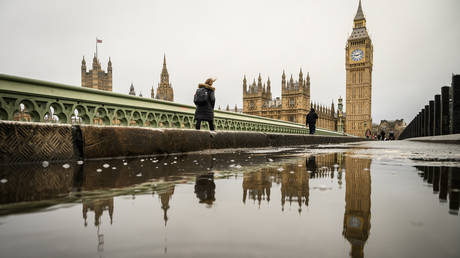 London Ukraine talks downgraded as big players withdraw
London Ukraine talks downgraded as big players withdraw
US Vice President J.D. Vance echoed the sentiment, warning on Wednesday that Washington might “walk away” from talks unless Kiev and Moscow reach a deal soon, and stating that “both will have to give up some of the territory they currently own.”
Russia has repeatedly said that the status of Crimea and the four other former Ukrainian regions that joined Russia after referendums is not up for negotiation. Moscow insists recognition of the “reality on the ground” is vital for lasting peace.
Kremlin spokesman Dmitry Peskov cautioned this week against relying on media reports regarding US-Russia talks, warning that “a lot of fakes are being published now, including by respected publications.” He advised the public to trust official sources instead.



